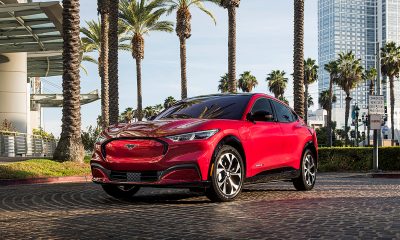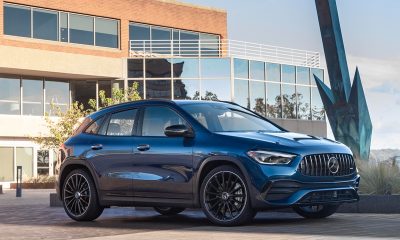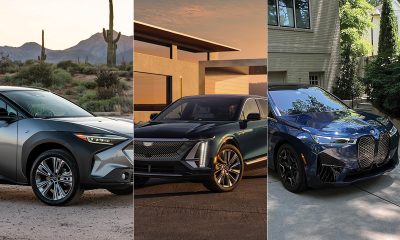Autos
Standout SUVs: Jeep Compass, Subaru Crosstrek
Americans still prefer larger vehicles to sedans
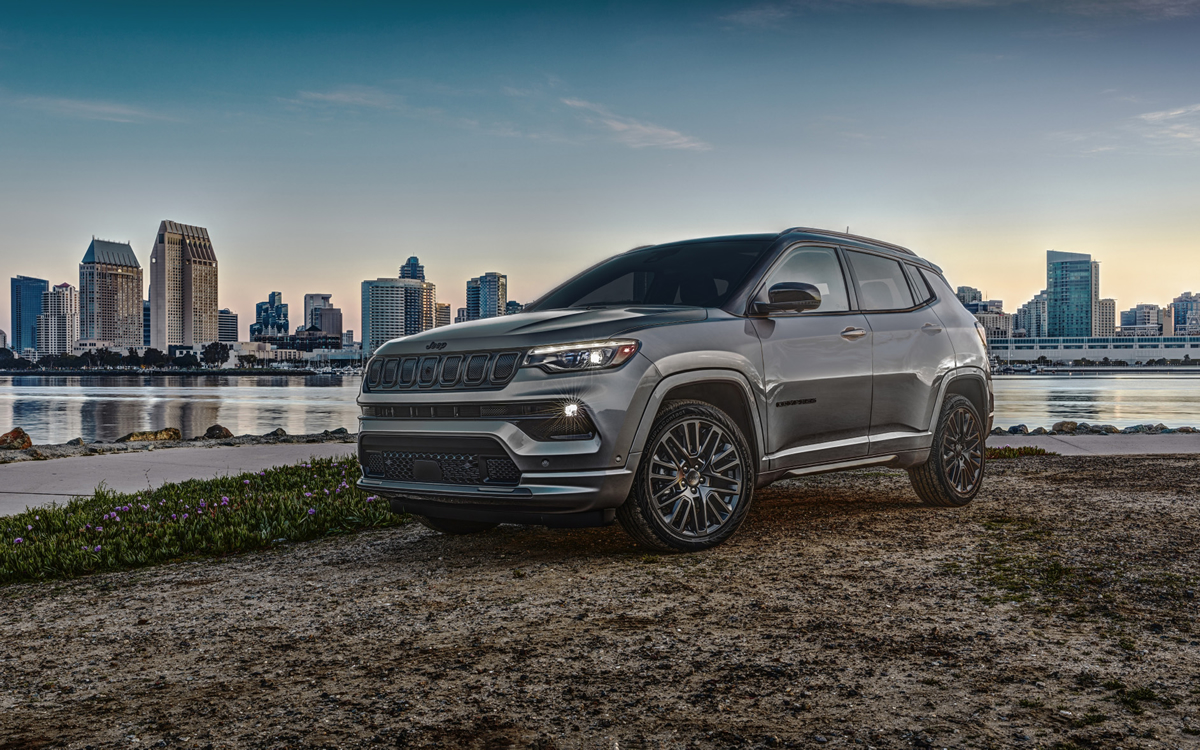
Last year Americans left many old-school chariots in the dust, buying twice as many SUVs as sedans. But while early pioneers like the Jeep Cherokee and Ford Explorer get props for leading the sport-ute charge, today there are more than 170 models. I recently test drove two newish SUVs that kinda-sorta remind me of my Pride bracelet: They make a statement, but at an affordable price.
JEEP COMPASS
$29,000
MPG: 24 city/32 highway
0 to 60 mph: 7.5 seconds
Cargo room: 27.2 cu. ft.
PROS: lots of amenities, good storage, all-wheel drive
CONS: some pricey options, stiff ride, bit noisy cabin
IN A NUTSHELL: Redesigned last year, the Jeep Compass gets a stronger engine for 2023. More power usually means reduced fuel efficiency, but mileage is up almost 10% from the previous model. Another plus: More stowage space, which had been sorely lacking. And all-wheel drive is now standard, so better traction and handling, especially on slick or gravelly terrain.
Despite having chiseled looks like the midsize Jeep Cherokee, the smaller Compass feels lighter and more limber. But while this compact SUV can handle light off-roading, the short wheelbase makes it hard to ignore potholes or speed bumps. In fact, I often had to slow down to a crawl to not seesaw jarringly over them. In other words, any Barbie or Ken wannabes with perfectly coiffed hair will want to stick to smoother surfaces when driving this vehicle.
The well-built cabin is much improved, with higher quality materials. The dash is covered in soft-touch leather—a nice touch—with a 7-inch digital instrument cluster and 10.1-inch touchscreen. Plenty of legroom and headroom in front, but tallish backseat passengers may feel a bit squished.
There are five trim levels, including the top-of-the-line Trailhawk, with more aggressive styling and solid off-road capability. I tested the mid-range Latitude Lux, which costs $5,000 more than the base model but comes with larger wheels, heated seats, and other niceties.
Notable tech features: smartphone integration, Wi-Fi hot spot, Bluetooth, wireless charging, voice recognition, remote start and nine-speaker Alpine stereo.
But it’s the list of safety gear that rally wowed me, such as rearview camera, park assist, lane-departure warning, driver-attention monitoring, rear-seat passenger reminder, pedestrian and cyclist detection, blind-spot monitor, forward collision warning with active braking, and—whew!—so much more.
SUBARU CROSSTREK
$27,000
MPG: 28 city/34 highway
0 to 60 mph: 9.1 seconds
Cargo room: 20 cu. ft.
PROS: decent mileage, comfy seats, user-friendly cabin
CONS: poky base engine, so-so storage, plasticky dashboard
IN A NUTSHELL: With so much sport-ute competition these days, automakers seem to be revamping their SUV models each year (not every four to six years, as in the past). This time, the Subaru Crosstrek receives some nifty design flourishes and major cabin upgrades. Compared to the butch Jeep Compass, the curvier Crosstrek looks trés chic. Think boyish Buck versus trendy Eddie on “911.”
Based on the nimble Impreza hatchback, the subcompact Crosstrek feels car-like and agile. Two engine choices, but opt for the more potent powerplant so it doesn’t feel like you’re just treading water. While the Crosstrek is smaller and slower than the Compass, the ride here is smoother and more composed. Higher ground clearance, tighter suspension and quick all-wheel drive system all help, as does a new direct-steering system. Plus, paddle shifters, which I only needed to use once or twice when merging into traffic, provide plenty of extra oomph.
The Crosstrek cabin, which is surprisingly quiet, offers good legroom for passengers in both the front and back. An optional 11.6-inch infotainment touchscreen is mounted vertically, similar to those iPad-like displays found in the Ford Mustang Mach-E and various luxury vehicles.
It says something when my biggest beef with the Crosstrek is the placement of the odometer reset button, which is only a smidge above the remote start button. Both buttons are completely obscured behind the steering wheel, so I was constantly reaching around and pressing the wrong one. A minor annoyance, to be sure. But if Subaru could fix this ergonomic annoyance, then I wouldn’t have to listen to my husband claim that the problem is actually my own “user error.”
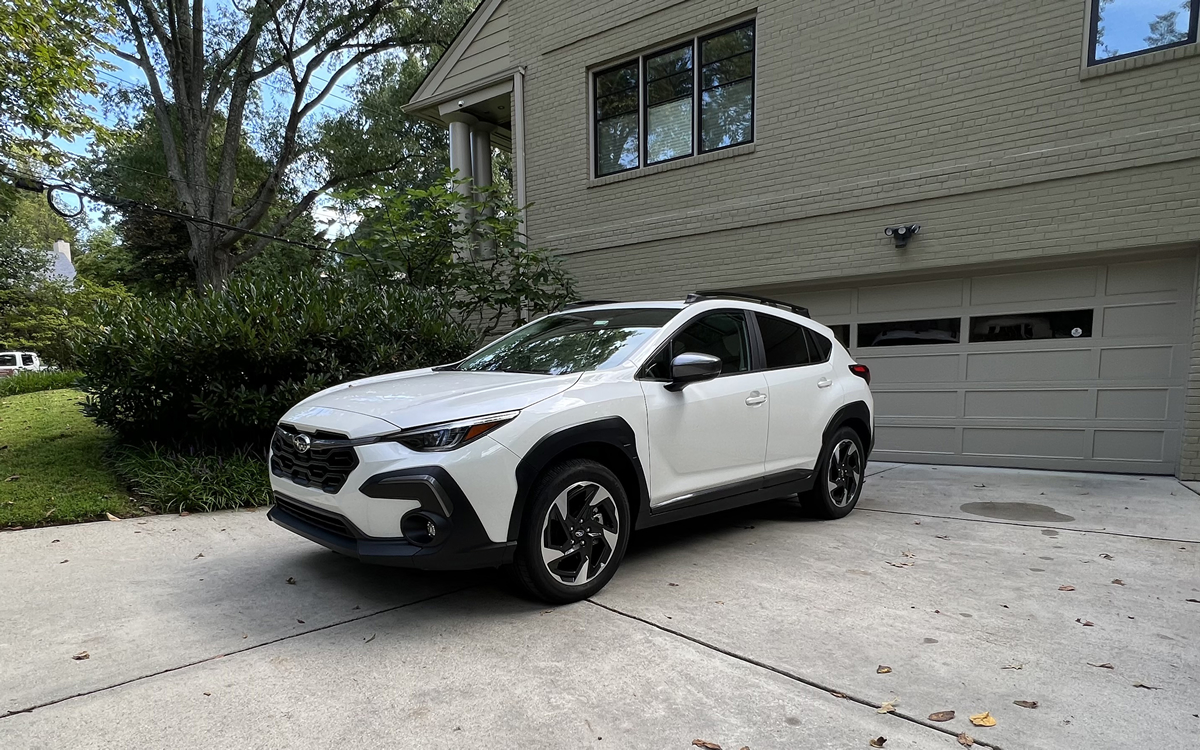
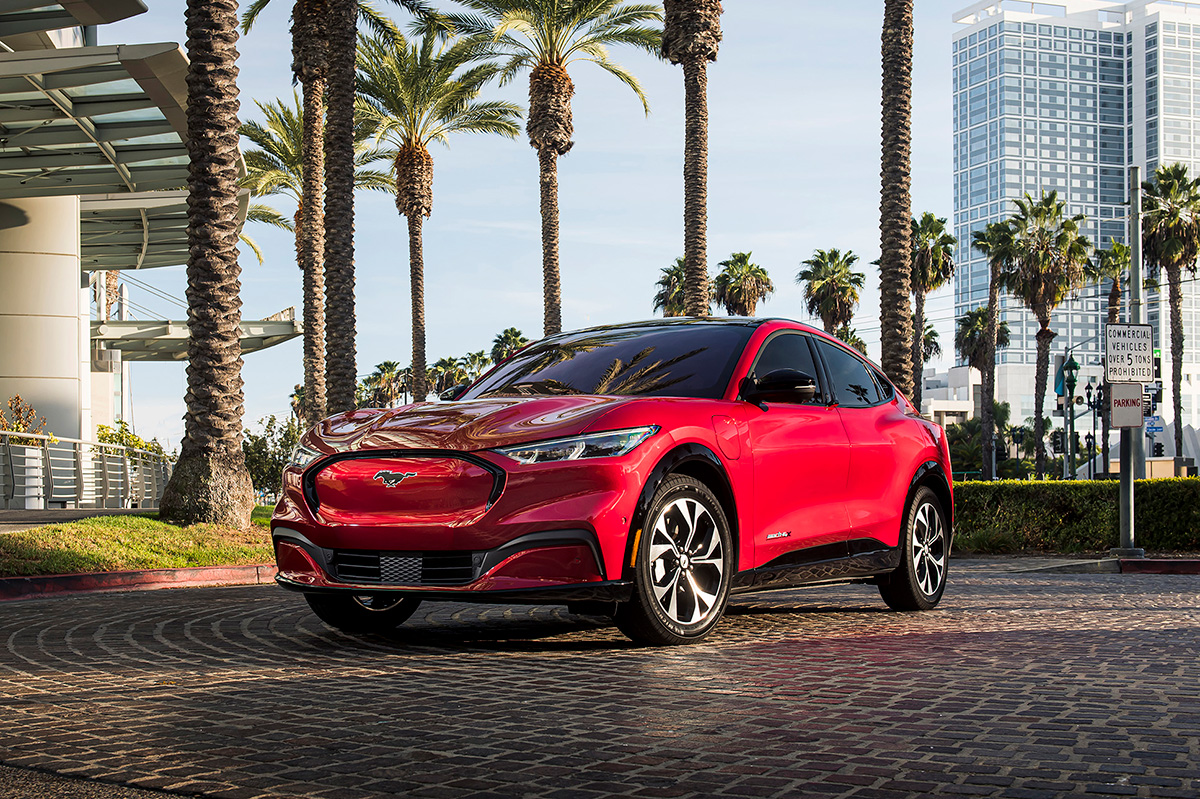
Looking to roll into something new? With all the buzz about 25% tariffs, it’s the perfect time to grab a new ride before prices soar—especially for electric vehicles, which may soon wave goodbye to those oh-so-attractive federal tax credits. Whether you are an eco-conscious commuter or just need a chariot for weekend getaways, these three green machines offer some serious swagger.
FORD MUSTANG MACH-E PREMIUM
$42,000
Range: 250-300 miles (depending on battery pack)
0 to 60 mph: 5.2 seconds
Cargo space: 29.7 cu. ft.
PROS: Zippy. Sporty feel. Ample battery range.
CONS: Bit bumpy over potholes. Limited seat adjustments.
IN A NUTSHELL: With sleek curves and a design that’s hotter than a drag queen’s heels on the runway, the Ford Mustang Mach-E blends both power and flair. The exterior colors are vibrant and unapologetically bold, just like the rainbow after a storm. Three trim levels, but opt for the spiffy Premium version—which was what I drove and is a nice step up from the $37,000 base model. It also costs a lot less than the gutsy GT, which tops $55,000.
Inside, the Mach-E is like driving a chic lounge on wheels. Toggling through the 15.5-inch touchscreen feels like navigating through the latest TikTok trends. A panoramic glass roof and faux-leather upholstery come standard, but assorted add-ons—standard features with the Premium trim—include hands-free power liftgate, multicolor ambient lighting and 10-speaker Bang & Olufsen stereo. There’s also plenty of space for all the essentials: totes, coats and besties.
And let’s not forget about battery range—there’s enough juice here to take you through a whole day of driving without needing a recharge. With Ford’s fast-charging network, it’s easy to be powered up quicker than you can say, “Ride ‘em, cowboy!” Well, almost.
How popular is this EV, which looks more like a hot hatchback than an SUV? Last year, sales spiked 27% and outsold the iconic gas-powered Mustang. So yes, the Mach-E Premium isn’t just any vehicle—it’s an experience that’s, well, electric.
KIA SPORTAGE PHEV X-LINE PRESTIGE

$44,000
MPGe: 84 city/highway combined
0 to 60 mph: 7.1 seconds
Cargo space: 39.6 cu. ft.
PROS: Comfy. Comely cabin. Oodles of passenger room.
CONS: Clunky dual-use dashboard controls. Bit noisy interior.
IN A NUTSHELL: Next up: the 2025 Kia Sportage PHEV X-Line Prestige, a compact plug-in hybrid that combines style, strength and versatility into one dazzling package. If the Mach-E Premium is a glam EV star, I found the Sportage PHEV to be an SUV showstopper.
Under the hood, power comes from an electric motor and gas-powered backup, so you get the best of both worlds—whether cruising on green energy or unleashing your inner diva. The all-electric range is almost 35 miles, and all-wheel drive is standard—which helps keep things steady, no matter the weather.
Inside, it’s pure comfort. While there are two hybrid trim levels, even the base-model—the X-Line—is fairly loaded: LED headlights/taillights, dual-zone automatic climate control, remote start, power liftgate, nav system, wireless charging pad, smartphone integration and more.
For my weeklong test vehicle, I was spoiled with the X-Line Prestige, which is full of a ridiculous number of amenities and safety gear. Let’s just say the clever cabin design would make the folks at Ferrari blush. Oh, and thanks to the pristine acoustics from the Harmon Kardon audio, I could have sworn the cast of “Hamilton” was right there with me belting out each tune. “Blow Us All Away,” indeed.
MERCEDES AMG C 63 S E
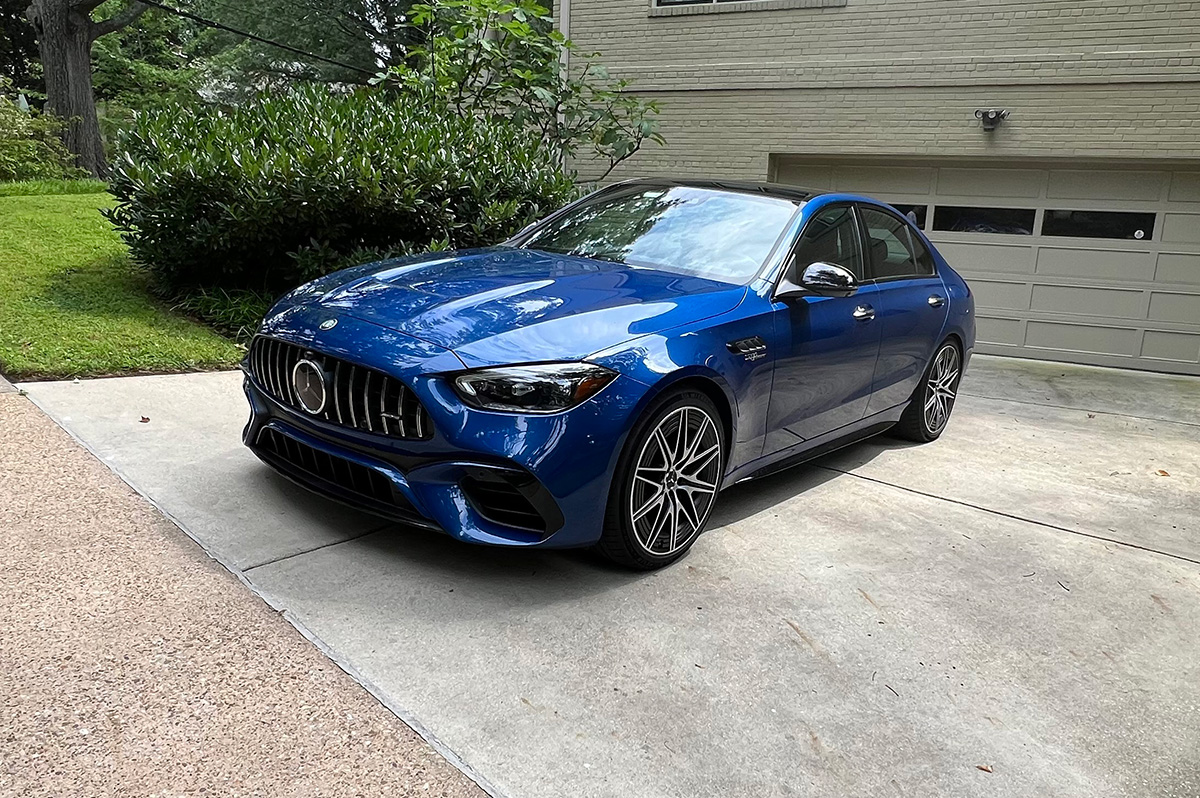
$87,000
MPGe: 40 city/highway combined
0 to 60 mph: 3.3 seconds
Cargo space: 11.6 cu. ft.
PROS: Snazzy. Lightning fast. Haute handling.
CONS: Pricey. Quirky steering-wheel controls.
IN A NUTSHELL: Jonesing for an exciting, eco-friendly sedan? Then look no further than the Mercedes AMG C 63 S E plug-in hybrid, which gets the adrenaline pumping each time you slip behind the wheel.
Under the hood, there’s a staggering 671 horsepower—enough to leave competitors in the dust and make them more than a little jealous. This AMG-tuned Mercedes—the quickest C-Class ever—blasts from 0 to 60 mph in just 3.3 seconds, faster than your heart rate when seeing your next crush at a circuit party. And that’s not even the best part—the shapely contours of this sportster are as chiseled as Luke Evans’ check bones.
Inside, the cockpit is like a designer outfit made for a fab night out—high-quality material everywhere, as well as branded sport seats with top-tier upholstery and stitching. One downside: the steering-wheel controls, which look tasteful but can be a tad too touch-sensitive at times.
Still, this elegant ride exudes more than enough bells and whistles to maintain a constant state of euphoria.
Autos
Mad about Mercedes — and a Mini Countryman, too
These three spiffy SUVs not too basic, not too complicated
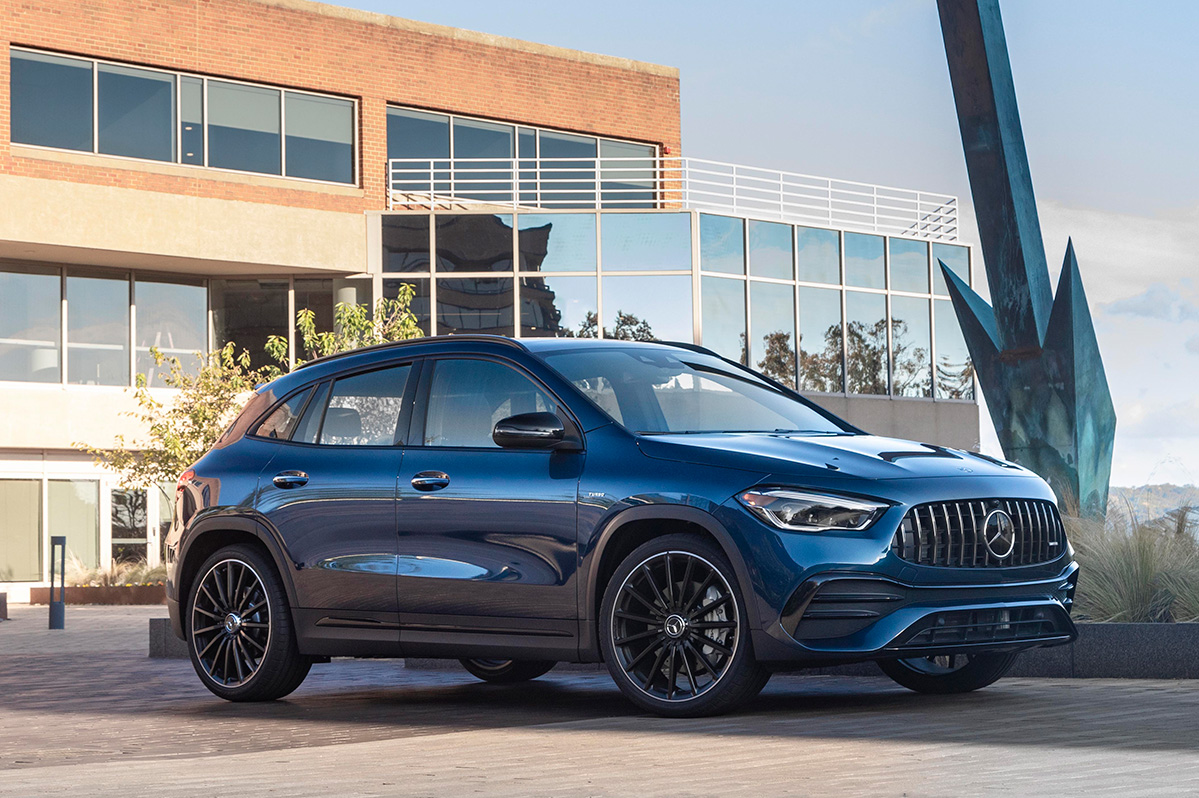
Not too basic, not too complicated. That’s what I enjoyed most about three spiffy SUVs recently. Call it the Goldilocks effect, but each ride—two Mercedes and a Mini Countryman—seemed just right. That’s a big plus in today’s world of extremes.
MERCEDES AMG GLA 35
$59,000
MPG: 22 city/28 highway
0 to 60 mph: 4.7 seconds
Cargo space: 15.4 cu. ft.
PROS: Affordable luxury, smooth suspension, zippy.
CONS: Bit noisy inside, so-so storage, costly options.
IN A NUTSHELL: The subcompact GLA—the most affordable Mercedes sold in the U.S.—comes in two trim levels. With the average price of a vehicle topping $48,000, the base-model GLA 250 is a bargain at $43,000. On paper, the stats for acceleration, handling and braking look spot on. Ditto the fine amenities, including faux-leather seats, ambient lighting, wireless charging pad and power liftgate. Toss in numerous safety features—including forward-collision warning, blind-spot alert, an automated parking system—and what could be better? The answer is the sport-tuned AMG GLA 35, which is the vehicle I tested. Zippier, grippier and ritzier than its entry-level sibling, this saucy SUV is also pricier. And beware: The long list of options—such as head-up display, surround-view camera, illuminated door sills—can add up quickly. But oh, what a thrill. Stomp on the accelerator, and the GLA 35 scoots from 0 to 60 mph in just 4.7 seconds—a full two seconds quicker than the GLA 250. Along with a more powerful engine and all-wheel drive, there’s now a 48-volt hybrid-assist system. The GLC 35 also flaunts aggressive styling, including a sexy rear spoiler, large dual exhaust tips and bigger wheels. Fave feature: the flat-bottom, performance-oriented steering wheel with spiffy paddle shifters and a panoply of user-friendly buttons and dials.
MERCEDES AMG GLC 43 COUPE
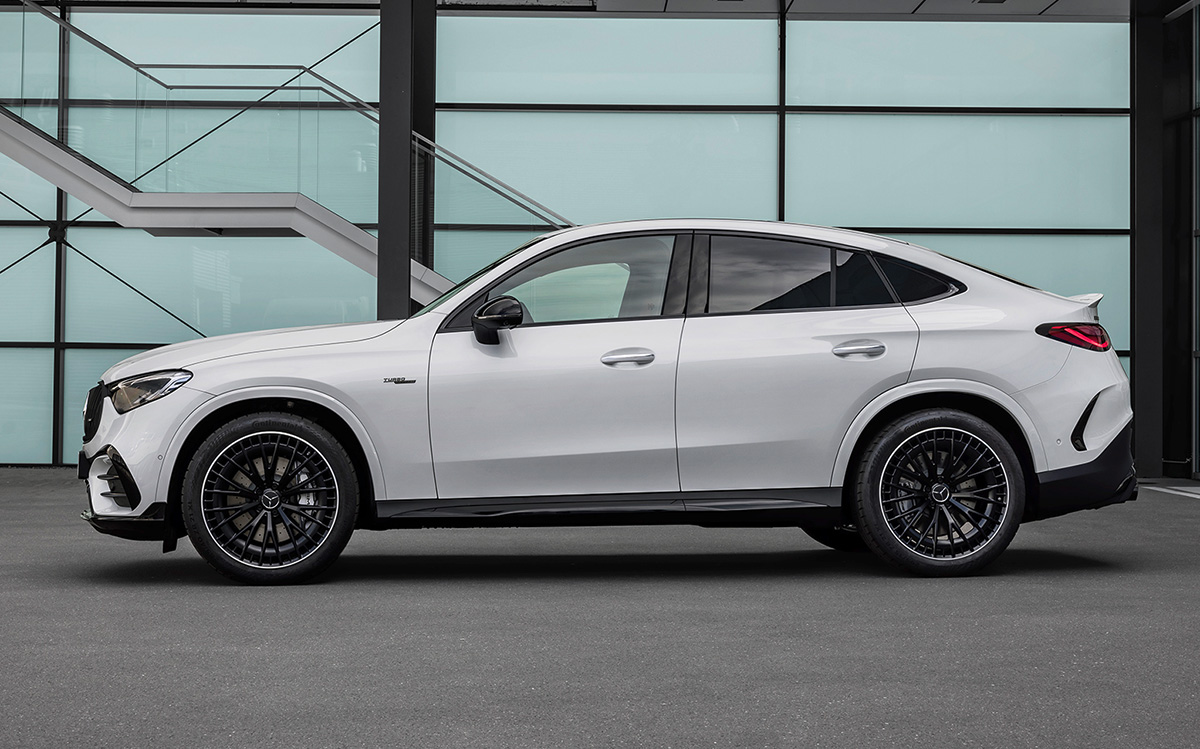
$70,000
MPG: 18 city/24 highway
0 to 60 mph: 4.7 seconds
Cargo space: 19.2 cu. ft.
PROS: Posh styling, potent power, quiet cabin.
CONS: Pricey, limited rear visibility, reduced cargo room.
IN A NUTSHELL: Stepping up from the baby Mercedes GLA, the larger GLC—though technically a compact—is 12 inches longer. What’s more, this hauler comes with choice of five trim levels. And you can choose from either a traditional square-back design or sloped coupe-like styling. Confused? Don’t be. Just trust that the AMG GLC 43 Coupe, which is really an SUV, checks all the boxes. There’s plenty of drama here, with a bulging snout and sinuous shape that any diva would love. There’s also plenty of power, with a gritty turbo that allows the GLC to accelerate just as fast as the much lighter GLA. And the interior is stunning: NASCAR-like bucket seats, gigantic infotainment touchscreen and reinforced window glass to better insulate the cabin. A clever nav system can project traffic and other info onto the head-up display on the windshield, and rear automatic braking helps anticipate and prevent a back-end collision. Sure, the low-slung roofline cuts into rear-seat headroom and cargo space. But for me, the sacrifice was worth it. After all, it’s hard to imagine any other glam-but-gutsy ride equally at home on a fashion runway or at the racetrack.
MINI COUNTRYMAN ALL4
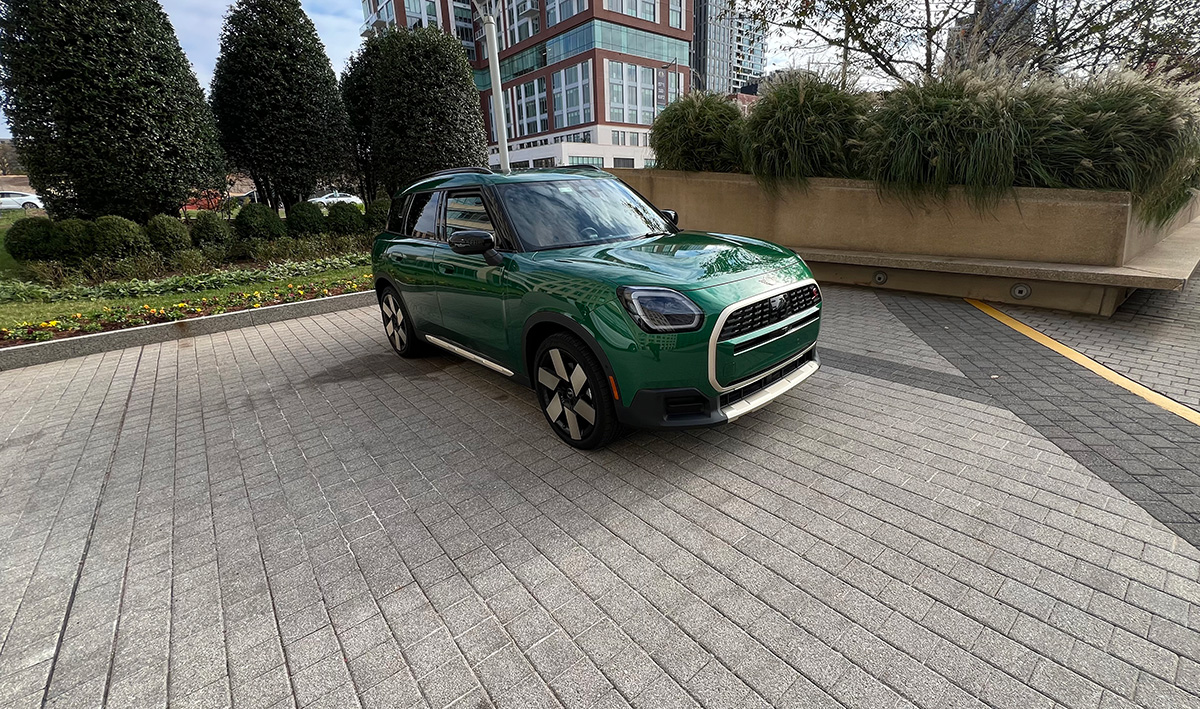
$40,000
MPG: 24 city/32 highway
0 to 60 mph: 5.9 seconds
Cargo space: 24.9 cu. ft.
PROS: Bigger, faster, better.
CONS: Almost too big, bit less playful, higher MSRP.
IN A NUTSHELL: Fully redesigned for 2025, the Mini Countryman enjoys a slew of up-market changes but retains some of its retro quirks. Larger than before, this latest model—with so much extra room for passengers and cargo—feels comfy and spacious. Almost too much so. At first blush, I was reminded of a Subaru Forester or Outback. Both fine vehicles, but without that familiar Mini vibe. Luckily, the steering wheel, head-up display and large Frisbee-shaped infotainment display all channel the previous Countryman. Ditto the overall exterior, which now boasts a redesigned grille, sleeker headlights and refined rear treatment. Yet I missed seeing all the toggle switches and some other playful touches. In their place, though, is a groovy dashboard with nifty LED lighting that changes colors based on the driving mode. While some digital readouts initially seemed too techy, they ended up being very user friendly. And there are two standout features: a huge panoramic moonroof and the use of sustainable materials for the carpeting, seats and such.
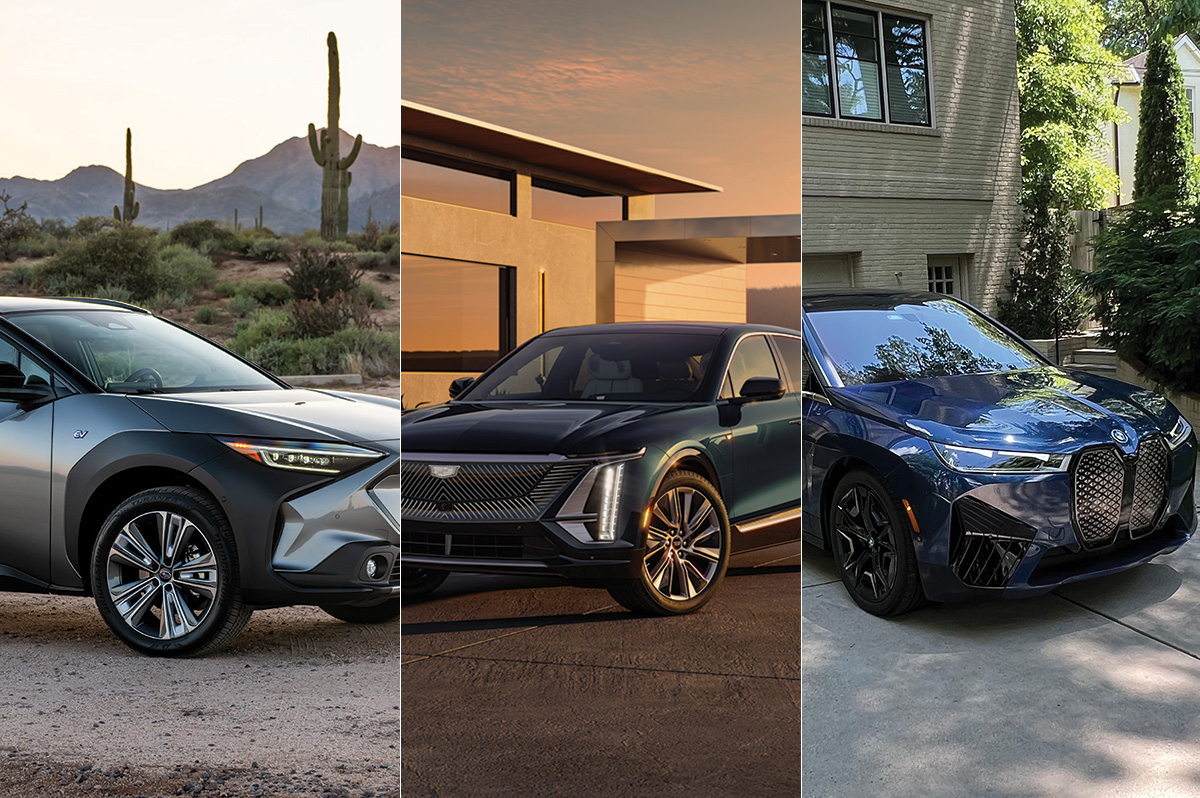
Electric vehicles are charging ahead, despite recent saber rattling by politicians. After testing a bevy of EVs, the rides below certainly got my motor running.
BMW iX (midsize SUV)
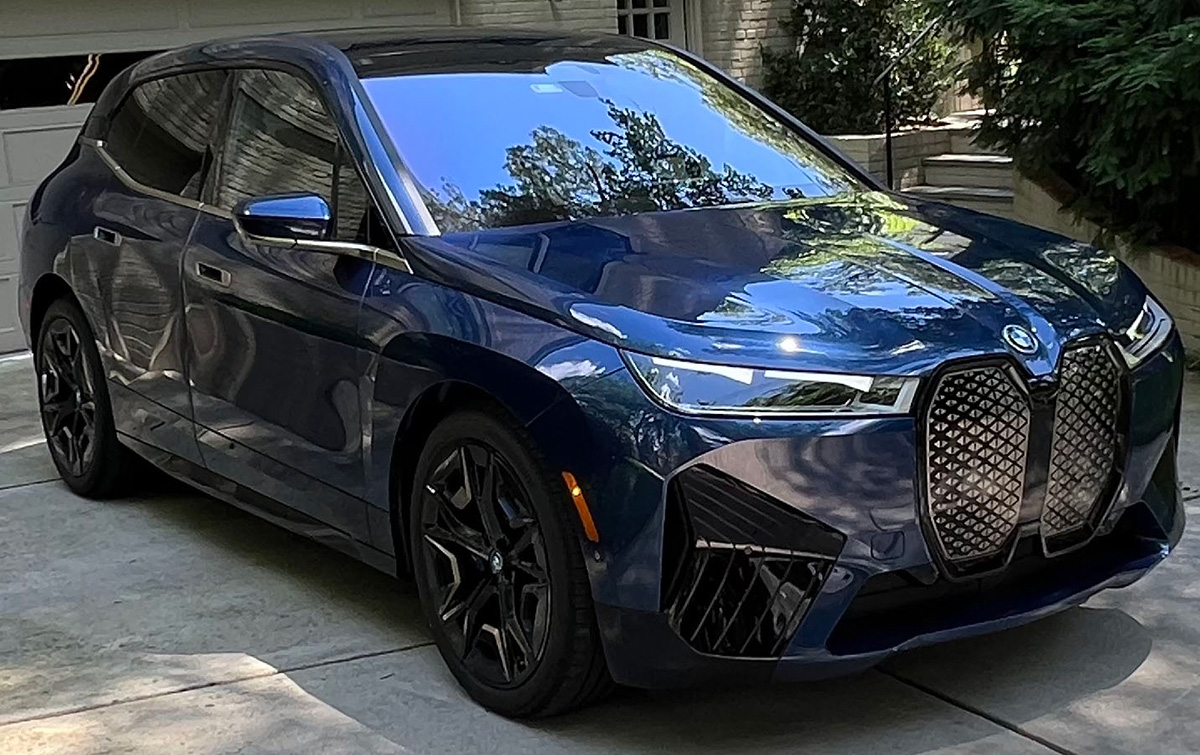
Price: $89,000-$113,000
Range: 288 to 324 miles
0 to 60 mph: 4.0 seconds
Cargo space: 35.5 cu. ft.
WHAT’S TO LIKE: Fun styling. Funky steering wheel. Floating center console. Oh, and cameras, radar and other sensors hidden in the grille, which has a special coating to magically erase minor scratches and dings. I was blown away when the BMW iX debuted in 2022. Three years later, the thrill is still there. Acceleration, cornering and braking? All breathtaking, in both the base model xDrive50 and high-test M60. Gizmos now include eye-tracking software so you can change lanes simply by glancing toward one of the side-view mirrors. An expansive digital monitor above the dash holds both a 14.9-inch infotainment display and 12.3-inch digital gauge cluster. And many materials — such as carpet and floor mats — are recycled. A truly eclectic electric? You bet.
CADILLAC LYRIQ (midsize SUV)
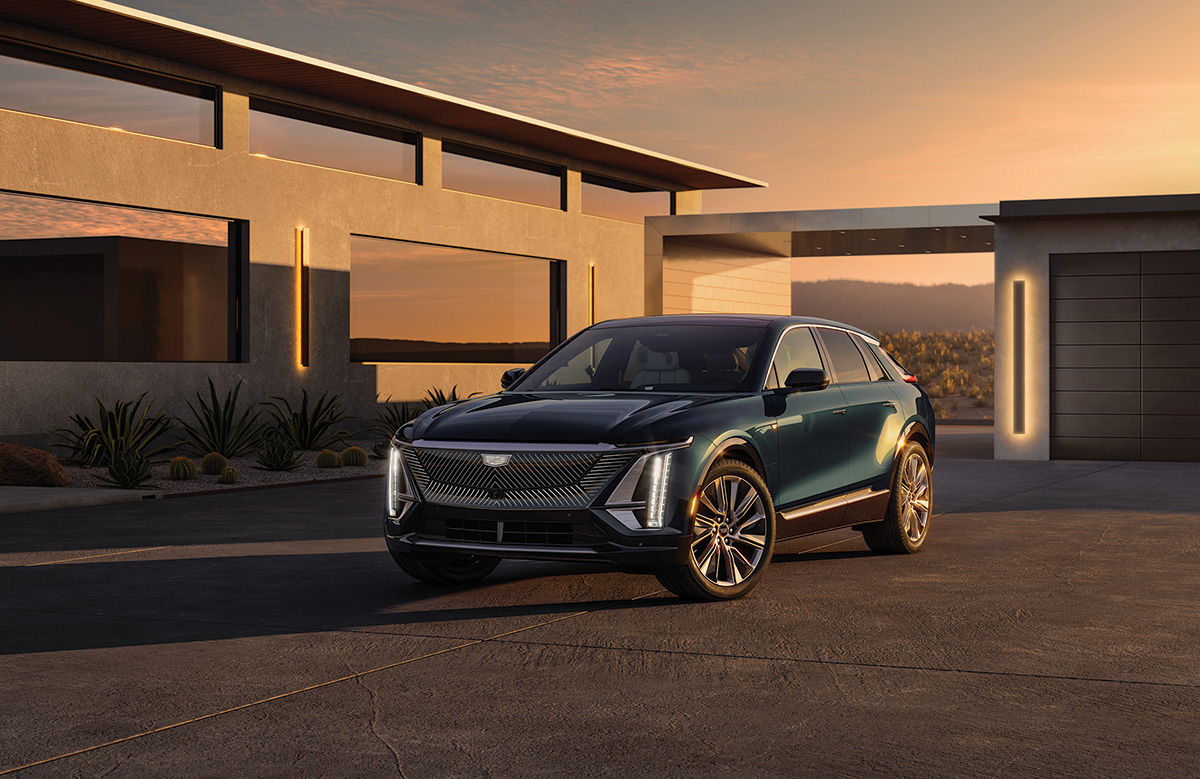
Price: $60,000-$70,000
Range: 314 miles
0 to 60 mph: 5.7 seconds
Cargo space: 28.0 cu. ft.
WHAT’S TO LIKE: If a BMW iX is cutting edge (say, like “Transformers One”), then a Cadillac Lyriq is old-school cool (a la “Deadpool & Wolverine”). Handsome design. Familiar feel. Quiet cabin. Handling is more affable than athletic. Ditto the acceleration. The land-yacht aura extends to the seats, which are cushy instead of taut. For older — er, more mature — drivers, this is a plus. But there’s plenty of tech here, too: 33-inch digital display, tri-zone climate control, hands-free driving, wireless charging pad and so on. When first sliding behind the wheel, I wished the navigation/infotainment interface was more intuitive. But a stellar voice-assistant system more than made up for it.
KIA EV 9 (large SUV)
Price: $57,000-$76,000
Range: 230 to 304 miles
0 to 60 mph: 4.9 seconds
Cargo space: 20.2 cu. ft.
WHAT’S TO LIKE: A cyborg in the city? With Robocop styling and Tron-like finesse, the Kia EV9 looks and feels out of this world. Three-row seating, with scads of passenger room. Lowering all the rear seats expands cargo capacity to fit more than 15 suitcases. And unlike most EVs, the EV9 can tow up to 5,000 pounds. Yet the hulky hauler behaves like a nimble ninja, easily darting in and out of traffic. At almost 6,000 pounds, the King Kong Kia is three tons of fun —literally. There are so many creature comforts — self-leveling suspension, ambient lighting, massage seats, rear-window shades, 14-speaker Meridian audio—you would think this was a Range Rover.
MERCEDES EQE (midsize SUV)
Price: $80,000-$110,000
Range: 265 to 307 miles
0 to 60 mph: 5.6 seconds
Cargo space: 14.0 cu. ft.
WHAT’S TO LIKE: Luxury is as luxury does and Mercedes does luxury well. With a dashing design, silken ride and hushed interior, the EQE sets a high bar. Four trim levels, including the awe-inspiring AMG with 617 horsepower. Everything is state-of-the-art: powertrains, suspension, safety, multipixel headlights, cabin air purifier, Burmeister stereo and more. An augmented-reality nav system monitors traffic, weather and such, then conveys this info into graphic overlays on the head-up display. And the standard faux leather seats? They look and feel like the real thing. One downside: minimal cargo space. But then, there’s always a full-size EQS topping out at $180,000.
NISSAN ARIYA (compact SUV)
Price: $40,000-$56,000
Range: 205 to 289 miles
0 to 60 mph: 7.5 seconds
Cargo space: 22.8 cu. ft.
WHAT’S TO LIKE: Cute, compact, comfy. It’s easy to like a Nissan Ariya, with its cheeky exterior, composed handling and low price. Choice of two battery packs, as well as two-wheel or all-wheel drive. Base-model pricing is hard to beat, but beware the tradeoffs: pokey acceleration and reduced range. Luckily, the other trim levels offer more oomph. All Ariyas come loaded: LED headlights, heated steering wheel, heated front/rear seats, nav system, head-up display and lots of safety gear. Notable options: panoramic sunroof, hands-free liftgate, limited hands-free cruise control, automated parking and illuminated kick plates. Overall, I found the ride smooth, though not sporty. Racing mavens may want to look elsewhere, but it’ll cost you.
SUBARU SOLTERRA(compact SUV)
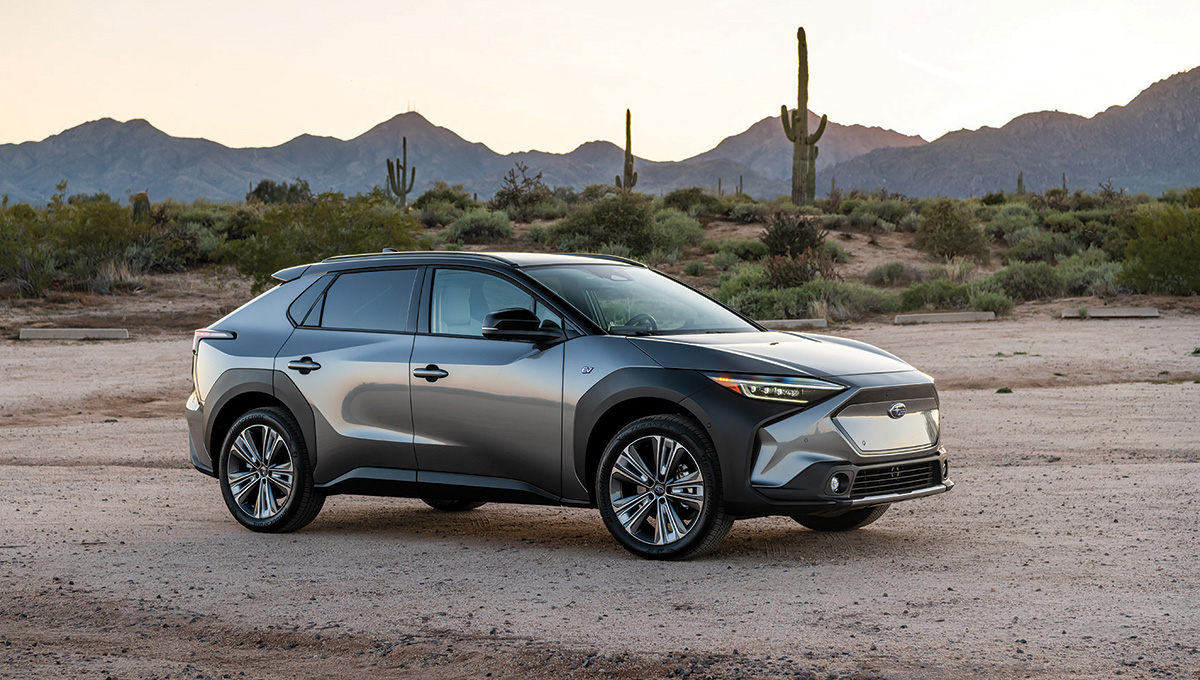
Price: $40,000-$47,000
Range: 222 to 227 miles
0 to 60 mph: 6.1 seconds
Cargo space: 27.7 cu. ft.
WHAT’S TO LIKE: The first EV from Subaru — the Solterra — boasts origami-like flair. Built in tandem with the quirkily named Toyota bZ4X, both SUVs fall a bit short in battery range —less than 230 miles. But the Solterra comes standard with all-wheel drive, roof rails and front cross-traffic alert. Plus, it now has faster charging times, as well as hands-free driving at up to 25 mph and an automatic lane-changing system used in conjunction with the turn signal. While not a true off-roader, this “Subie” has above-average ground clearance — 8.3 inches — to better tackle snow and potholes. And I liked all the storage compartments, along with dual-level cargo floor to fit extra luggage.
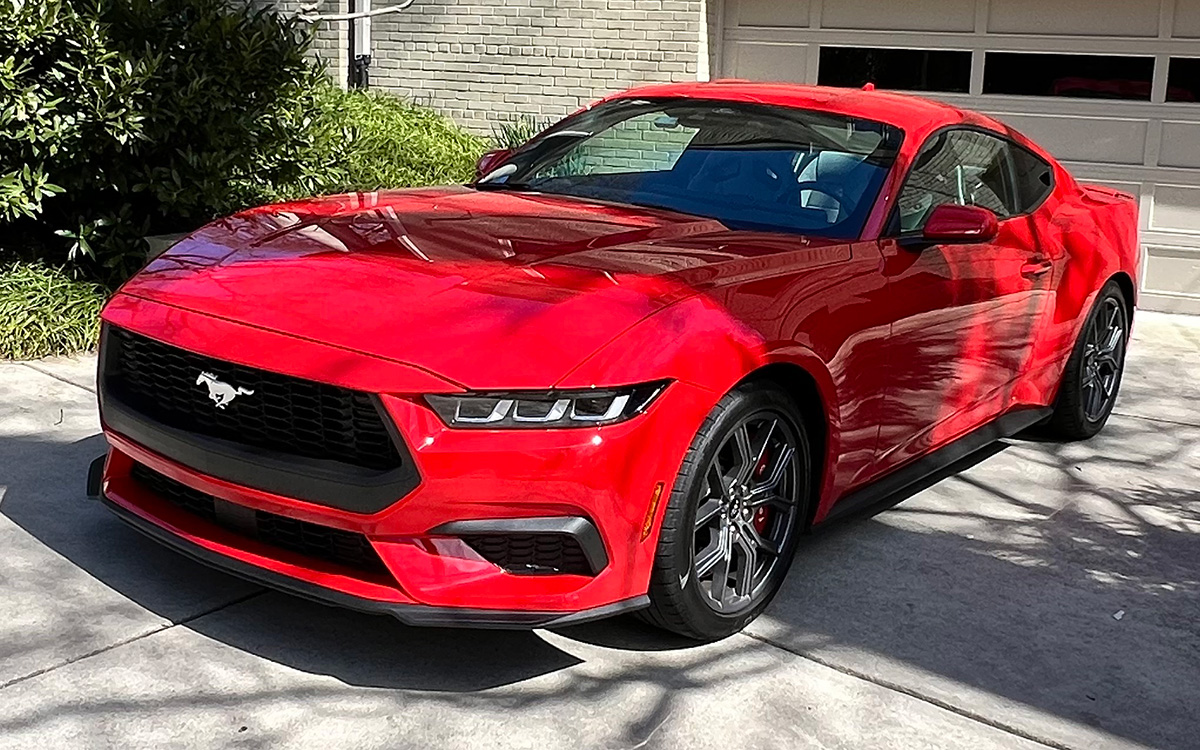
I’ve written before about my first car: a used-but-pristine sports coupe, bought by mom for my 16th birthday. Recent test drives in two cool coupes brought back a flood of fond memories from those gawky teenage years.
But while a two-door ride may not be the most practical vehicle for a decades-older me, it’s easy to appreciate the fast-and-furious allure.
After all, buying a sports car is often associated with a midlife crisis. So who knows, there still may be room—or vroom!—for a sportster in my future.
FORD MUSTANG ECOBOOST
$33,000
MPG: 22 city/33 highway
0 to 60 mph: 5.6 seconds
Cargo space: 13.5 cubic feet
PROS: Muscle-car moxie. Surefire handling. Tech-laden cabin.
CONS: Snug backseat. Pricey options. Intra-model competition.
IN A NUTSHELL: Introduced in 1964, Ford hoped to sell 100,000 Mustangs annually. But by tapping into the Boomer zeitgeist, almost 700,000 units were sold the first model year. Mustang is now the automaker’s longest running nameplate and the best-selling sports car in the world.
This was the original “pony car,” with a high-test engine, long hood and affordable price tag. Luckily, the latest Mustang — recently redesigned and in its seventh generation — has stayed true to its roots.
So, too, has the EcoBoost engine. Developed 15 years ago as a more enviro-friendly powerplant, these turbos often have been used on base models. The latest EcoBoosts — there are more than half a dozen — are 20% more fuel efficient and produce 15% fewer emissions than other Ford engines. And while the original could barely eke out 122 horsepower, today’s four-cylinder EcoBoost in the Mustang delivers 315 horsepower.
The only bummer: no manual transmission. For that, you need to dig deeper into your wallet — much deeper. The Mustang GT, with a 486-horsepower V6, costs $50,000. And the boffo Dark Horse trim level, boasting a 500-horsepower V8, is $62,000. These MSRPs are without any options, which add up quickly.
But the Mustang EcoBoost still offers plenty of features: LED headlights, keyless entry, smartphone integration and Wi-Fi hotspot. Various driving aids—blind-spot monitor, rear-parking sensors, lane-keeping assist, forward collision warning with automatic braking—are all standard.
The stodgy interior has been replaced with a mod, techno cabin with better upholstery and soft-touch surfaces. Various configurations of the digital instrument panel can be viewed at the whim of the driver. And the larger, 13.2-inch infotainment screen is user-friendly.
Such upgrades remind me of the Mustang Mach-E. Though purists initially derided the use of the Mustang label on a four-door electric SUV, the Mach-E was the fourth best-selling EV last year. Similar in price and acceleration to a traditional gas-powered ‘Stang, the Mach-E is arguably just as fun. But add in the retro-cool factor, and there’s no comparison.
SUBARU BRZ
$33,000
MPG: 20 city/27 highway
0 to 60 mph: 6.6 seconds
Cargo space: 6.3 cubic feet
PROS: Sporty. Zippy. Fits anywhere.
CONS: Low ground clearance. Bouncy. Tiny trunk.
IN A NUTSHELL: The Subaru BRZ may not have the aura of a Ford Mustang, but this compact coupe still checks plenty of boxes.
Porsche-like styling. Precision steering. Punchy power. Even pricing is a plus, with a top trim level less than $37,000.
Despite Lilliputian dimensions — the BRZ is a third smaller than a Mustang — there’s still more passenger room than in the rival Miata. As a tallish driver, I appreciated the unexpected amount of headroom and legroom in the front seats.
But trunk space is another matter. With less than half the stowage space of a Mustang, don’t expect to haul more than a few grocery bags. And while you literally have to climb into certain jumbo SUVs and pickups, the opposite is true with the low-slung BRZ. These seats are so close to the chassis that it feels like sitting in a go-kart. Luckily, once I scooched myself down into the cabin, it didn’t take long to get used to the seating position.
Three trim levels, all with rear-wheel drive, dual-zone climate control, push-button start and Subaru’s renowned EyeSight package: adaptive cruise control, automatic high-beam headlights, lane-departure warning and automatic emergency braking. Step up to the Limited version for larger wheels, heated seats, fancier upholstery, extra safety gear and a better sound system. The performance-oriented tS comes with sport-tuned suspension, premium Brembo brakes, dark gray metallic wheels and sporty interior stitching.
Only one engine is available: a very capable 228-horsepower four cylinder. My test car also came with the six-speed manual transmission, which added more gusto.
With such a short wheelbase, the ride is firm but controlled. And keeping weight down on the BRZ must have meant installing less insulation. After all, there’s some noticeable road noise, especially on the freeway. But then, you also hear the constant purring and revving of the engine, which is music to the ears of sports-car aficionados.
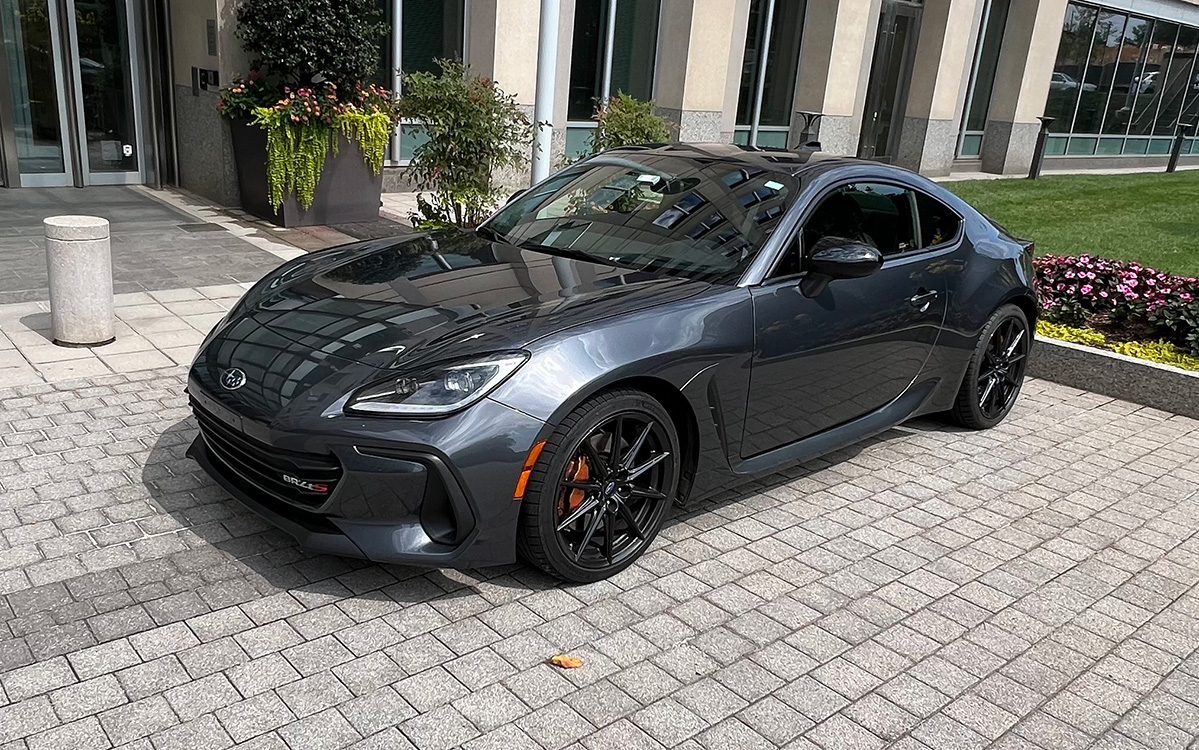
Autos
Sizing up EVs: Mini Cooper Coupe, Ford F-150 Lightning
One is small and nimble, the other spacious and super fast
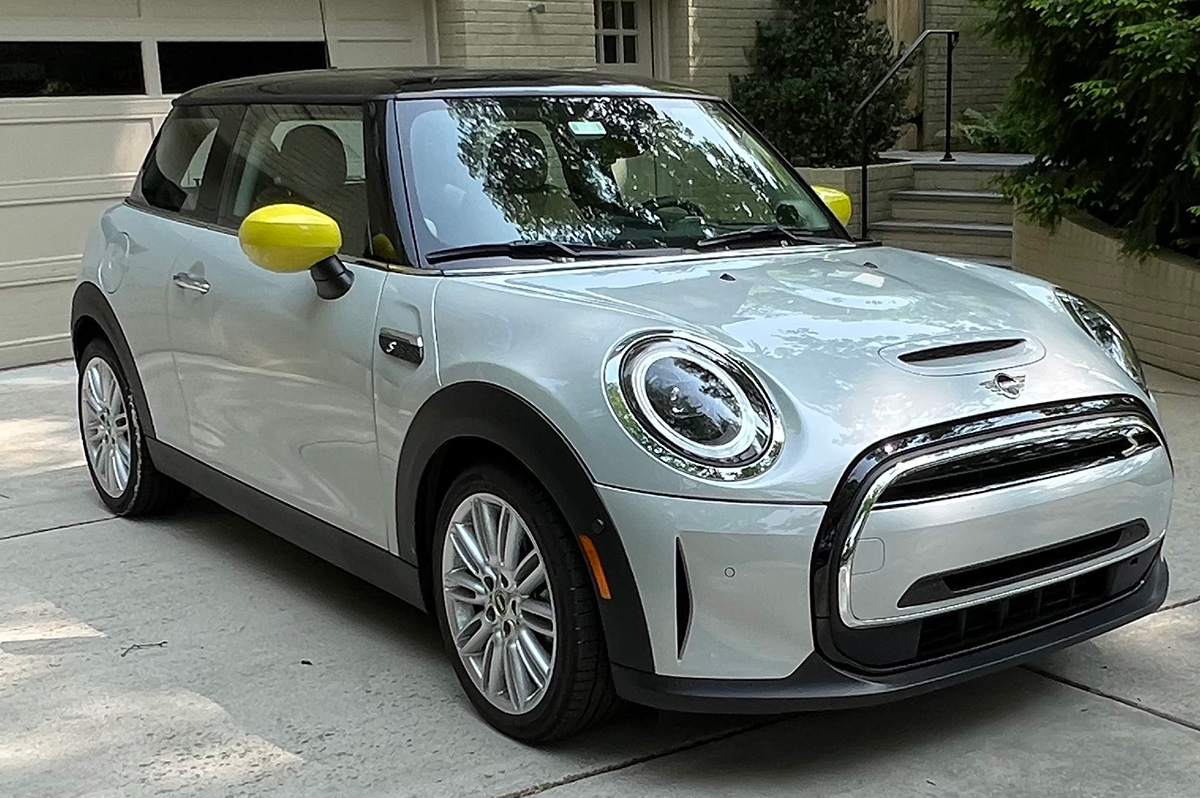
I’m a bit of a size queen when it comes to electric vehicles. After all, the bigger the battery pack, the lower the range anxiety. And EVs — with no engine or other components found on traditional gas models — can flaunt their larger cabins. Most EVs also deliver lickety-split acceleration, which can boost the size of any ego.
I recently test drove two David and Goliath EVs: one an itty-bitty roadster and the other a behemoth pickup.
So which was better? In the end, the answer was a matter of size.
MINI COOPER COUPE EV
$31,000
Range: 114 miles
Fastest charging time: 103 miles in 30 minutes (80% charged)
0-to-60 mph: 6.9 seconds
Cargo capacity: 8.7 cu. ft.
PROS: Quick. Nimble. Fun.
CONS: Battery range. Low chassis. Limited storage.
IN A NUTSHELL: With kicky styling, perky engines and quirky interiors, a Mini Cooper always makes me smile. The EV coupe is no exception, with funky yellow accents on the wheels, badging and side mirrors to distinguish this car from a typical Mini.
For such a compact car, there’s ample headroom and legroom. But cargo space is tight. Luckily, lowering the back seats triples the stowage area.
Up front in the Euro-chic cabin, there are plenty of retro toggle switches and tasteful chrome accents. As with other EVs, a digital readout indicates the exact time the vehicle will be fully charged. The nav system, which displays a “range circle” to show how far the Mini can go without running out of juice, also maps out the best “green” route to travel. That’s a nice touch, because the driving range here is only 114 miles. Luckily, the regenerative braking system is extra-grippy to help conserve energy. And by just barely lifting your foot off the accelerator, this coupe slows so dramatically that you only need to brake when coming to a full stop.
Best of all, handling is exceptional. Despite the low ground clearance — just 5.6 inches — the Mini Cooper easily handles speed bumps and torn up roads. And during my daily commute, this go-kart wannabe easily scooted through a sea of overbearing semis and SUVs on the Beltway.
Overall, the Mini Cooper EV is affordable and fits anywhere. It may even put a smile on your face.
FORD F-150 LIGHTNING
$58,000
Range: 240-320 miles
Fastest charging time: 201 miles in 42 minutes (80% charged)
0-to-60 mph: 4.1 seconds
Cargo capacity: 52.8 cu. ft.
PROS: Lightning fast. Sedan-like comfort. Super storage.
CONS: Pricey trims. Increased competition. Towing saps the battery.
IN A NUTSHELL: Compared with a Mini Cooper EV, the Ford F-150 Lightning is a Maximus chariot. At 19 feet long and more than six feet tall, this pickup is seven feet longer and two feet taller than the miniscule coupe. The Lightning also weighs 6,000-plus pounds, which makes it three times heavier than the Mini. And the Lightning’s towing capacity — at up to 10,000 pounds — is four times greater.
Despite the gargantuan proportions, this Herculean beast rides and handles like a lithe sedan. No, the Lightning is not as nimble as a spritely Mini, but it’s surprisingly close — especially for a hauler with land-yacht proportions.
A fave feature: major storage space, including two glove boxes, an acres-long truck bed, a huge center console, and a frunk that can hold almost twice as much gear as the rear cargo bay in a Mini Cooper. The funky frunk is also water-resistant, drainable, lockable and has four 120-volt outlets and two USB chargers. There’s even an emergency release latch, just like in a standard trunk. Coolest of all, with just two taps to the key fob, the frunk’s lid opens and closes electronically—which makes the Lightning look like some sort of Leviathan sea monster.
Power comes from two electric motors configured to provide standard all-wheel drive. Add in the extended-range battery for more horsepower and torque, and the Lightning lives up to its Thor-like bona fides. Such wickedly fast acceleration is thrilling and, frankly, a bit scary.
Inside, the well-insulated cabin boasts many fine options, including max-recline seats, hands-free driving system, Bang & Olufsen premium stereo, twin-panel moonroof and a 15-inch infotainment screen that looks and behaves like an iPad.
When it comes to size, the Lightning is larger, faster and full of more storage space than a Mini Cooper. Yet the coupe costs half as much and is a better urban adventurer. It also seems a bit more practical, at least in the city.
Small versus large? It all depends on which size fits you best.
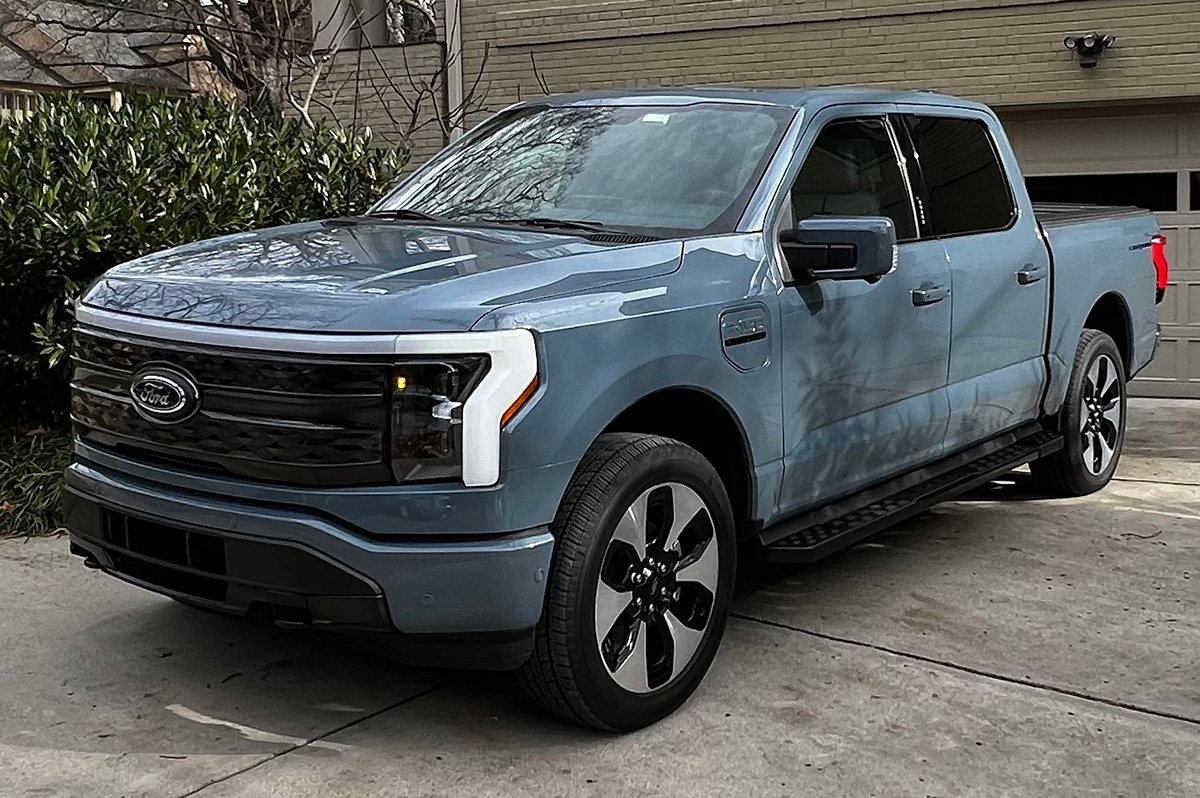
Autos
Cool compacts: Ford Maverick Lariat, Subaru Crosstrek Wildernes
The summer fireworks continue with two bangin’ rides
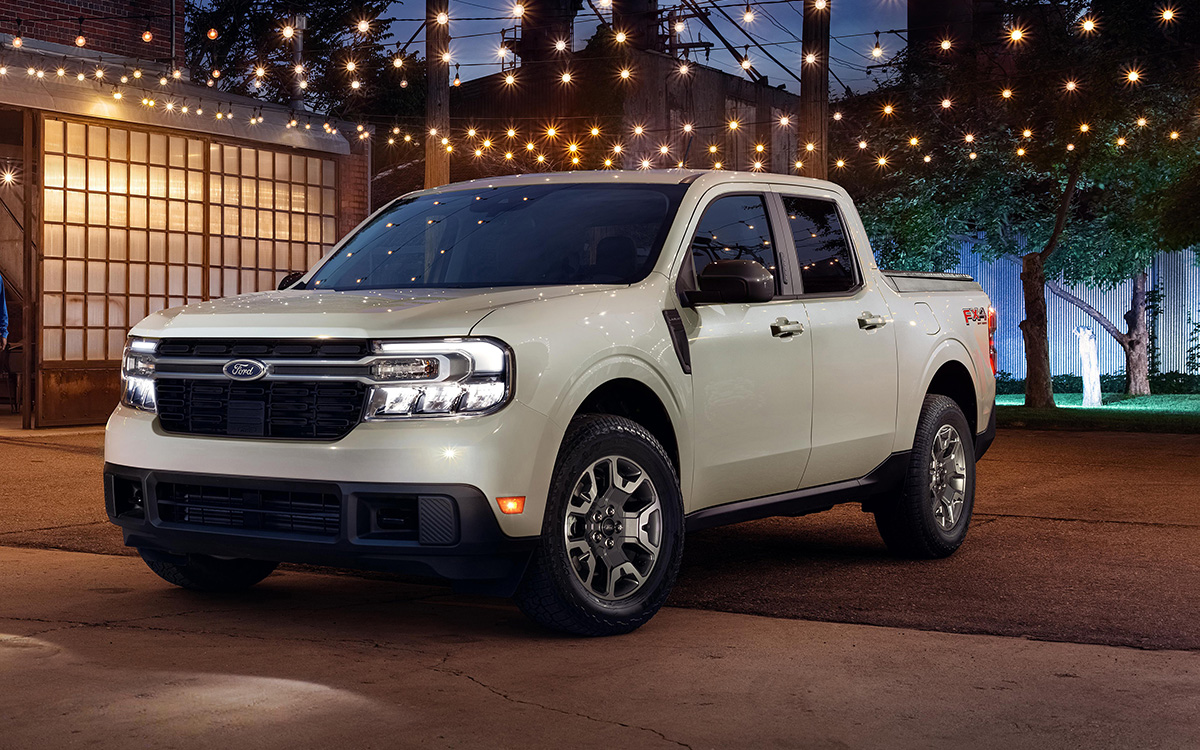
While the Fourth of July may be over, other fireworks continue with two bangin’ rides: the Ford Maverick pickup and Subaru Crosstrek SUV. Both are affordable compacts, though neither can be considered barebones and each vehicle offers some fresh surprises.
FORD MAVERICK LARIAT
$35,000
MPG: 22 city/29 highway
0-to-60 mph: 5.9 seconds
Cargo capacity: 33.3 cu. ft.
PROS: Very low price. Peppy. Lotsa storage.
CONS: Spartan base model. Bumpy ride. Pricey options.
IN A NUTSHELL: When I wrote a few years ago about the Ford Maverick, which was replacing the long-time Ranger, it was a pleasant surprise to learn this new pickup came standard as a hybrid. Such fuel efficiency—42 mpg in the city, 33 mpg on the highway—is still impressive. But this year Ford switched the Maverick’s powertrain availability, which means the hybrid is now a $1,500 option and the more powerful turbo engine comes standard. That’s a downer for fuel-conscious buyers, but a plus for anyone seeking more oomph under the hood.
Hybrid or no, the starting price of a base-model Maverick is still low: less than $25,000. This makes it the least expensive compact pickup out there. Available only as a four-door crew cab, there’s plenty of passenger and cargo room.The low-slung truck bed—which can carry cargo up to 1,500 pounds—makes loading and unloading easy. And despite its small size, this tough hauler can tow up to 4,000 pounds. Built on the same platform as two popular Ford SUVs—the Escape and Bronco Sport—the Maverick boasts handling more like a sedate sedan than a stiff truck. Well, at least that’s the case on the freeway. In town, the ride is bumpier than expected over potholes and such.
Three trim levels available: XL, XLT and high-end Lariat, which is what I test drove for a week. The XL is basic—with 17-inch steel wheels, cloth seats and a six-speaker stereo—while the XLT adds alloy wheels, power-locking tailgate and a rear armrest with cupholders. But the Lariat offers unexpected amenities, such as keyless entry, push-button start, synthetic leather upholstery, power-sliding rear window, heated seats, heated steering wheel, wireless charging pad and eight-speaker Bang & Olufsen stereo.
All Mavericks come with forward collision warning that automatically applies braking when necessary. But the Lariat adds adaptive cruise control, rear parking sensors, blind-spot monitor with rear cross-traffic alert, and evasive steering that kicks in to help avoid collisions.
For all you alphas, there’s a Tremor Off-Road package, which adds rough-and-rugged features like elevated ground clearance, advanced four-wheel drive, skid plates, off-road suspension, locking rear differential, all-terrain tires, full-size spare, and more aggressive styling and badging.
Alas, such options add up and can bump the sticker price close to $45,000.
SUBARU CROSSTREK WILDERNESS
$34,000
MPG: 25 city/29 highway
0-to-60 mph: 8.5 seconds
Cargo capacity: 20 cu. ft.
PROS: Off-road capability. Roomy. Comfy seats.
CONS: Plasticky interior. Bit noisy cabin. No speed demon.
IN A NUTSHELL: Subaru has its own maverick in the showroom: the tiny-but-mighty Crosstrek. Redesigned for 2024, the Crosstrek retains much of its quirky styling and adept handling. That’s a good thing, considering how hot this SUV has been the past few years.
There’s also a brand-new trim level: the Wilderness. While I was already a big fan of the Crosstrek, the Wilderness ratchets things up a lot.
Except for the BRZ sports car, all Subarus come standard with all-wheel drive. Yet the off-road prowess of the Crosstrek Wilderness is enhanced by front skid plate, extra drive modes, a tighter suspension and higher ground clearance (9.3 inches versus 8.6 inches on other Crosstreks). No, this is not a Jeep Wrangler or Toyota Land Cruiser, but the Wilderness is no slouch when tackling rutty roads or sandy terrain.
As for looks, the rugged styling includes hexagonal fog lights, 17-inch black alloy wheels with thick treads, black front and rear bumpers, and black cladding on the wheel arches to protect against scrapes. Faux copper accents—especially on the roof rack and steering wheel—signal that this is not your average Crosstrek.
With the back seats down, cargo space in all Crosstreks is 55 cubic feet (an impressive two-and-a-half times the area when the seats are up). As for towing, standard Crosstrek models can haul an impressive 1,500 pounds. But the Wilderness can tow even more—a whopping 3,500 pounds.
Inside, the high roofline makes the cabin feel surprisingly large. The gauges and displays—functional but not glitzy—are the same across the Crosstrek lineup. Notable options include power moonroof, 10-way power driver’s seat and 10-speaker Harmon Kardon audio.
The main difference between the Wilderness and other Crosstrek trims are the comfortable, water-resistant seats (made of synthetic leather upholstery) and the rubber floor mats emblazoned with the Wilderness logo.
All in all, this Crosstrek turned out to be a practical urban ride that also brought out my inner Paul Bunyan on weekends.
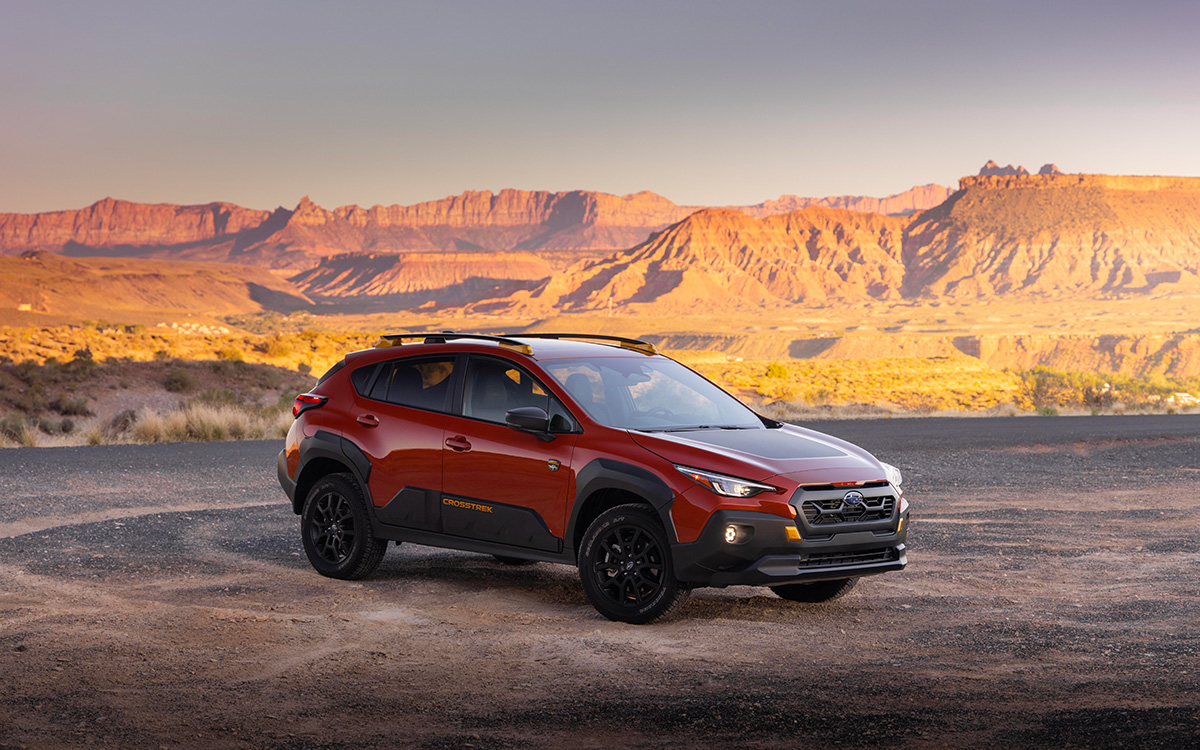
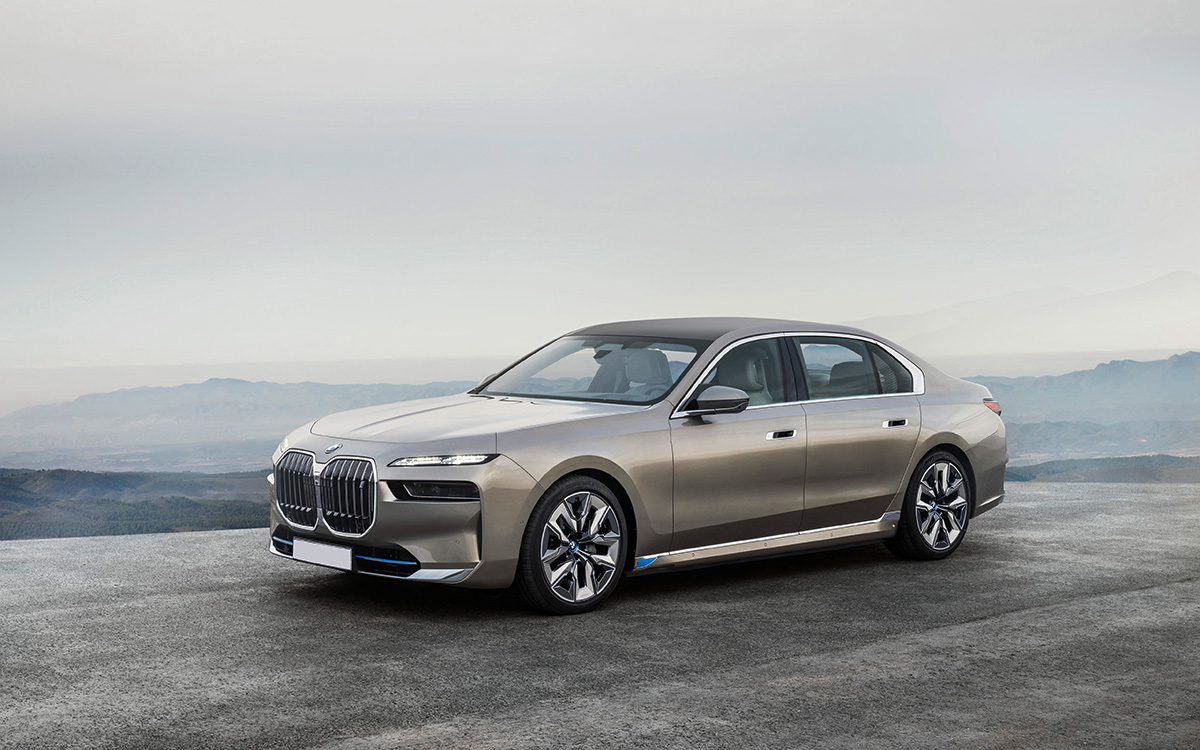
Sometimes it’s good to be a fairy godmother. That’s how it was for me when organizing a surprise dinner party for my husband Robert, who was celebrating a milestone birthday.
Event planning isn’t my thing, yet somehow the stars aligned. It seemed like all I had to do was wave a wand and — voila! — the magic began.
Make reservations at a fave intimate restaurant, which often gets booked months in advance? Zing! Ensure that family and childhood friends from across the country could all attend the same weekend? Zing! Find a handsome pianist to serenade us with Broadway show tunes. Zing again!
The only thing missing: a stunning chariot. But then, at the last minute, my test car for the week turned out to be—zing!—the all-electric BMW i7 xDrive60 glam sedan.
BMW i7 xDrive60
$121,000
MPGe: 87 city/95 highway
Range: 291 to 321 miles
Fastest charging time: 212 miles in 34 minutes (80% charged)
PROS: Hyper fast. Sublime cabin. Dazzling tech.
CONS: Pricey. So-so cargo area. A sedan in a world of SUVs.
IN A NUTSHELL: To drive or not to drive, that’s the question with the BMW i7. Rarely is it more exciting to be the passenger than the driver in a sports sedan, especially a Bimmer. But as I chauffeured my husband to the restaurant on his birthday, he seemed to be having way too much fun enjoying the dizzying array of creature comforts.
Spa treatment. The futuristic seats, made of quilted Merino leather, are as plush and comfortable as anything from Roche Bobois. But the optional cashmere/wool fabric looks and feels even better. All seats—both front and rear—come with ventilation and heating that activates much quicker than in most cars. The superb massage function does bodywork like a real masseur—but without the need to tip 20% when your session ends.
Concert-hall acoustics. Other high-priced rides offer premium audio, but the standard Bowers & Wilkens stereo in the i7 is bravo: 18 speakers and 655 watts. Better yet, my test car had the much-ballyhooed Diamond Surround Sound System, with 36 speakers powered by a 1965-watt amplifier. Yes, two of those speakers use actual diamonds to increase clarity. The result is perhaps the best-sounding vehicle acoustics ever.
IMAX-like screen. The Rear Executive Lounge Seating package adds a reclining right rear seat with footrest and a center console with foldable table that serves as a floating desk. Think first-class seating on an airplane. Most impressive is the huge, 31-inch 8K theater screen that drops down from the ceiling and comes with Amazon Fire capability. All rear window shades lower and the panoramic-glass roof shade closes when in theater mode. Built tastefully into the armrest on each rear door is what looks like an Apple iPhone to control the rear lighting, movie screen and other functions. Any home theater system should be so good.
Racecar features. Up front, the driver is spoiled with many other goodies. A curved digital screen, the same as in the cutting-edge BMW iX SUV, houses a 12.3-inch instrument cluster and 14.9-inch infotainment monitor. Two motors—one for each axle—creates an impressive 536-horsepower. Press the accelerator and—whoosh!—the i7 sprints from 0 to 60 mph in just 4.1 seconds. The amazing auto-leveling suspension absorbs potholes and speed bumps as if this 6,000-pound sedan were floating on air.
Rolls-Royce aura. BMW, which also owns Rolls-Royce, has sprinkled the i7 with stately design cues. This includes softer, more graceful styling and none of the severe, chiseled angles of previous BMWs. Other plusses: Swarovski crystals in the headlights and 22 precision-focused LEDs in the high beams. But the illuminated grille, while impressive, has a more ominous vibe. (Stephen King’s Christine, anyone?)
Full-size comfort. The i7 is a full-figured ride, more than 17-feet long and 6.4-feet wide. Here’s where the automatic parking comes in handy, allowing this BMW to parallel or perpendicular park itself. Trunk capacity is 18 cubic feet, which is decent but less than some competitors. Inside, though, there are plenty of clever storage compartments.
A pretty penny. Full of options, my test car was a wallet-busting $152,000. But that’s a bargain—well, sort of—compared with the high-performance i7 M70. With 650 horsepower and a 0-to-60 time of 3.5 seconds, the M70 is the fastest all-electric M car ever made. It also costs $169,000.
Alas, such sticker prices are too rich for my blood. Sorry Robert, maybe if we win the lottery.
Autos
Sport haulers: Jeep Grand Cherokee, Mercedes GLE-Class
Updated cabins, adept handling, and more
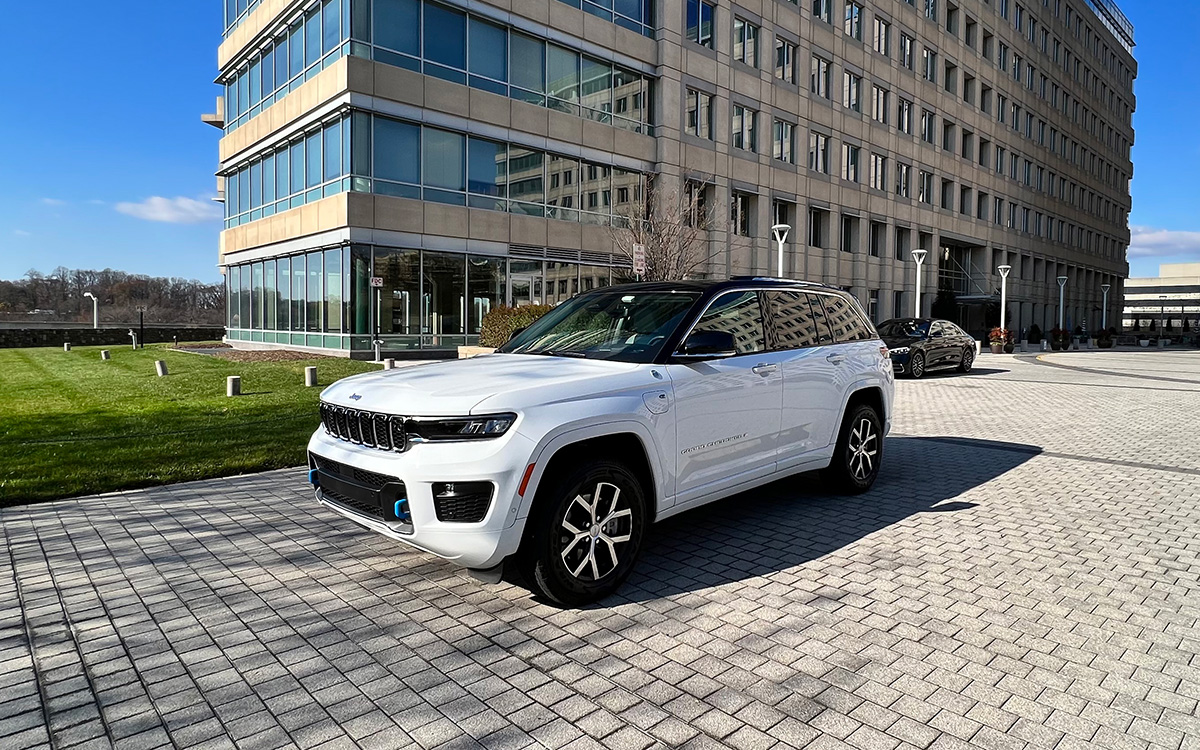
Now that March Madness and the Masters are over, it’s time for, well, everything else. For my husband and me, this means water sports, as in kayaks and rowing sculls, which is why we trekked to the Potomac for the George Washington Invitational regatta last weekend.
Alas, high winds splashed cold water on the event, canceling much of it. But there was still plenty of spirited camaraderie to rival “The Boys in the Boat.”
And I was reminded of my time years ago as a rower with D.C. Strokes, ferrying teammates to races up and down the East Coast. Back then my ride was a dated, rather cramped four-door sedan.
If only we could have paddled around in a sporty SUV like the two reviewed here. Now that would have been some smooth sailing (wink-wink).
JEEP GRAND CHEROKEE
$40,000
MPG: 19 city/26 highway
0 to 60 mph: 7.5 seconds
Maximum cargo room: 37.7 cu. ft.
PROS: Updated cabin, adept handling, strong towing
CONS: So-so gas mileage, no third row, pricey trim levels
IN A NUTSHELL: Rough, tough and buff. It’s doesn’t get much more butch than a Jeep. This year’s Grand Cherokee is no exception, with rugged looks, expert off-road capability and better-than-average towing capacity of 6,200 pounds.
There are a dizzying number of trim levels—more than a dozen—starting with the barebones base-model Laredo at an affordable $40,000. The lineup tops out with the Summit Reserve 4xe PHEV, which is almost twice the price at $76,000 and one of various plug-in hybrid versions available. Those plug-in hybrids can drive up to 25 miles on all-electric power before the four-cylinder gas engine kicks in. Otherwise, you can choose from a standard V6 or V8. Gas mileage on all trim levels is basically the same as the competition.
Where the Grand Cherokee really shines is in the handling. More refined than a Wrangler but less lavish than a Land Rover, this Jeep maneuvers just as well on city streets and highways as it does on bumpier terrain.
I tested the mid-range and mid-priced Overland, which comes standard with four-wheel drive and large 20-inch wheels. It also boasts a slew of niceties, such as quilted upholstery, panoramic sunroof and high-tech digital displays. These include a 10.25-inch infotainment touchscreen and rear-seat entertainment system.
The nine-speaker Alpine stereo, designed specifically for the Grand Cherokee, is pleasing. But I really wanted to hear the boffo 19-speaker McIntosh surround-sound system that Jeep also offers. Sigh, it’s only available on the premium Summit trim level.
MERCEDES GLE-CLASS
$64,000
MPG: 20 city/25 highway
0 to 60 mph: 6.6 seconds
Maximum cargo room: 33.3 cu. ft.
PROS: Lush interior, silky-smooth suspension, speedy
CONS: Some confusing electronics, tight third row, many competitors
IN A NUTSHELL: For a more high-class hauler, there’s the Mercedes GLE-Class. This midsize SUV is similar in size to the Jeep Grand Cherokee. But instead of seating five passengers, the GLE can carry up to seven. Sure, legroom in the optional third row may be tight for taller travelers, but it’s perfect for a cocky cockswain or two.
Six trim levels, ranging from the base-model GLE 350 to two high-performance AMG models. For eco-conscious buyers, the GLE 450e plug-in hybrid arrived earlier this year and can run on battery power alone for almost 60 miles.
My test car was the top-of-the-line AMG 63 S 4Matic, a head-turner in every way. Priced at a whopping $127,000, this GLE looks best in glossy black with the Night Package, which includes tasteful jet-black exterior accents and matte-black wheels. To complete the Darth Vader effect, there’s a deep, menacing exhaust rumble that’s downright threatening.
You expect such a ride to be wicked fast, and it is: 0 to 60 mph in a blistering 3.7 seconds. Yet the carbon ceramic brakes with their devil-red calipers are equally impressive in slowing things down quickly.
Inside, each GLE comes with two large digital displays on the elegantly sculpted dashboard. My favorite feature is the “Hey Mercedes” digital assistant, which responds to voice commands such as opening or closing the sunroof, operating the infotainment system or activating the climate controls.
It’s hard to find sport seats that are more comfortable, especially with the heavenly massage function (though those massage controls could be a bit more user-friendly.) For AMG models, the seats come with red-contrasting stitching and red seatbelts—a nod to the devilish demeanor under the hood.
Considering all the SUVs available in showrooms, few make quite the splash of a GLE.
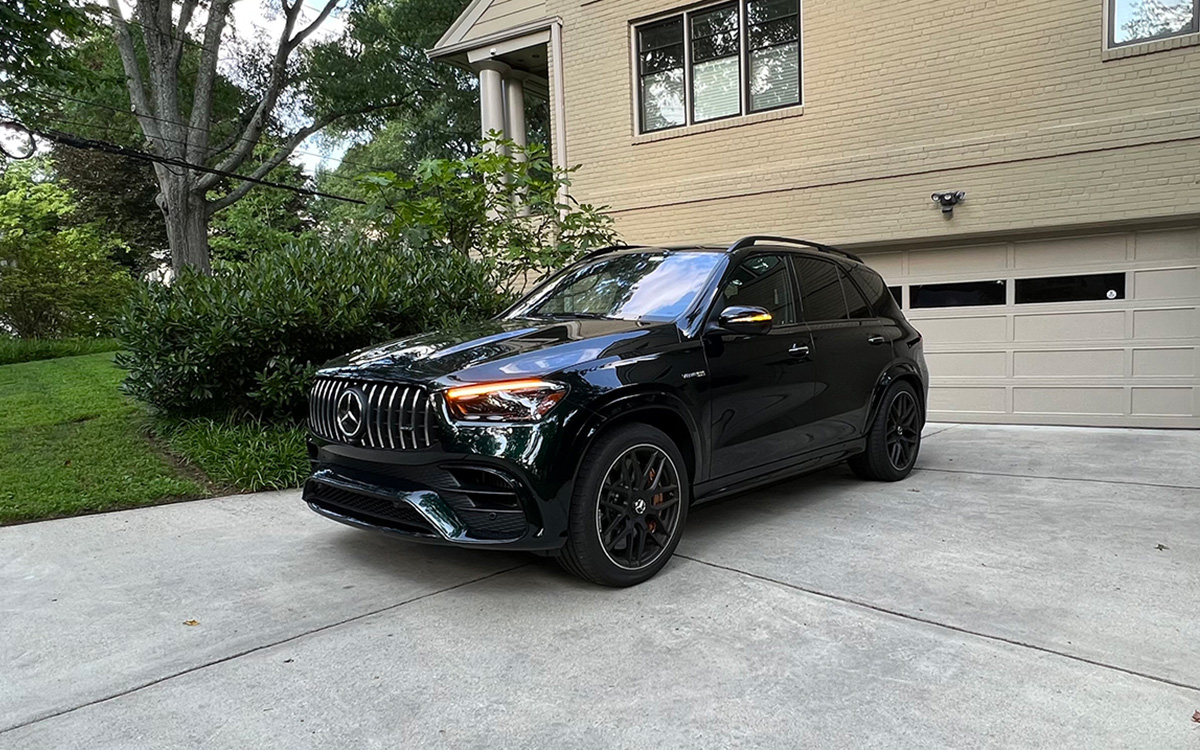
Autos
Glam rides: BMW X6 and Range Rover Velar
Impressive standard features elevate these lower-priced options
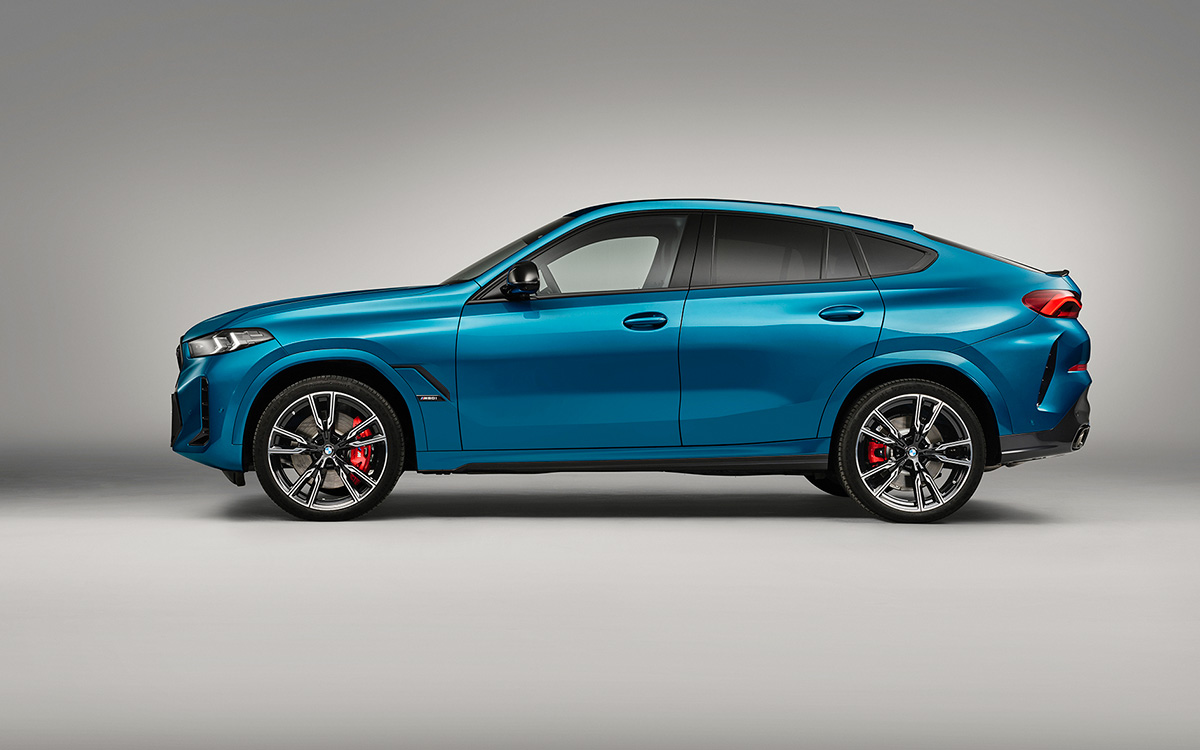
Many sport-utes with ho-hum styling still impress me by offering scads of standard features and a low MSRP. But sometimes it’s hard not to be seduced by what I call glam rides—pricier vehicles with plenty of attitude. You know, like something Cassandro might drive.
BMW X6
$75,000
MPG: 23 city/26 highway
0 to 60 mph: 5.2 seconds
Maximum cargo room: 59.6 cu. ft.
PROS: Outré styling, posh cabin, raw power
CONS: Less rear visibility, limited storage, costly options
IN A NUTSHELL: Trust me, it’s hard not to fall in love with a BMW X6. This recently updated crossover, with its coupe-like profile, swept-back grille and breathtaking acceleration, had me at hello. High ground clearance and oodles of high-tech features turn this high-end hauler into one helluva wild ride.
Sure, the sharply sloped roof hampers rear-seat headroom and cargo capacity. But up front there’s more room than expected, along with a dramatically curved digital dashboard. And the ginormous panoramic moonroof helps make the interior feel quite spacious.
How good is this BMW? Zipping up to Baltimore last month during a day of downpours and clueless commuters, my husband and I started rethinking our promise to never buy a budget-busting vehicle. For us, bad weather and heavy traffic usually result in clenched teeth, heavy sighs and my swearing like a sailor. Yet the hushed cabin, 16-way power front seats and ability to control the stereo and other functions simply by waving my hand were all very Zen. Ditto the finely tuned suspension, steering and braking, which anticipated my every move. Instead of shying away from rush hour on our return home, I leaned in.
Myriad safety features — from forward-collision alerts and blind-spot monitors to lane-departure warnings and a 360-degree camera — batted away any concerns about fender benders. Same for the option packages that allow you to park the X6 automatically, store familiar maneuvers and drive hands-free at up to 85 mph.
Power in the base-model — which is what I test drove — comes from a lively 375-hp turbo, with a 48-volt hybrid system to improve gas mileage. There’s also a smooth eight-speed automatic transmission and all-wheel drive for sure handling on slippery roads. Pricing begins at $75,000, but options on my test car brought it up to—whoa!—88,000.
For more grit and growl, there’s the xDrive60i, with a 523-hp twin turbo that helps this Bimmer sprint from 0 to 60 mph in 4.2 seconds. And the top-of-the-line X6 M Competition with a 617-hp V8 is even faster at a blistering 3.7 seconds. But I am much too afraid to drive this gnarly high-test model—it starts at $128,000.
RANGE ROVER VELAR
$63,000
MPG: 19 city/25 highway
0 to 60 mph: 5.2 seconds
Maximum cargo room: 70.1 cu. ft.
PROS: Refined design, chic interior, lotsa storage
CONS: Tepid base engine, more sedate handling, pricey
IN A NUTSHELL: While Range Rovers are known for being oh-so-classy, the Velar is much sassier than the rest of the lineup.
The sweeping front fascia would make Ariana Grande proud: Svelte grille, sporty wraparound headlights and stretched, corset-like air ducts in the bumper.
Inside, the look is spartan but elegant. All knobs and other switchgear are mostly hidden or activated by an 11.4-inch infotainment touchscreen that seems to hover in front of the dash. Even the ubiquitous cruise control and stereo buttons on the steering wheel seem to have vanished, though look closer and they are tastefully integrated into the design.
While the Velar may be classified as a compact vehicle, it looks and feels much larger. Compared with the midsize BMW X6, both have ample seating for five people. Front-seat dimensions are practically the same, but the supposedly smaller Range Rover has better back-seat headroom and legroom. It also holds almost 20% more cargo.
Built on the same platform as the popular Jaguar F-Pace, the Velar has a relaxed ride compared to the more athletic BMW X6. Power is less aggressive on the Range Rover, with choice of two competent but hardly rip-roaring engines.
Build quality is impressive, including the optional leather-free interior that uses an upscale composite of wool and polyurethane. And while even the base-model comes with interior ambient lighting and a premium Meridian stereo, you can opt for the 17-speaker 3D system for an even more “Maestro”-like experience.
Overall, the Velar may be less of a rabble rouser than the BMW X6, but there’s still plenty here to dazzle the senses.
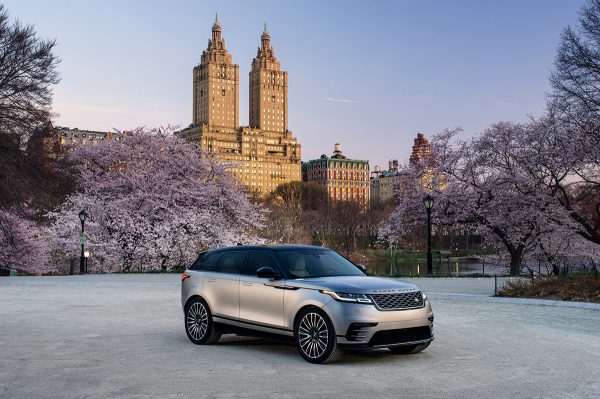
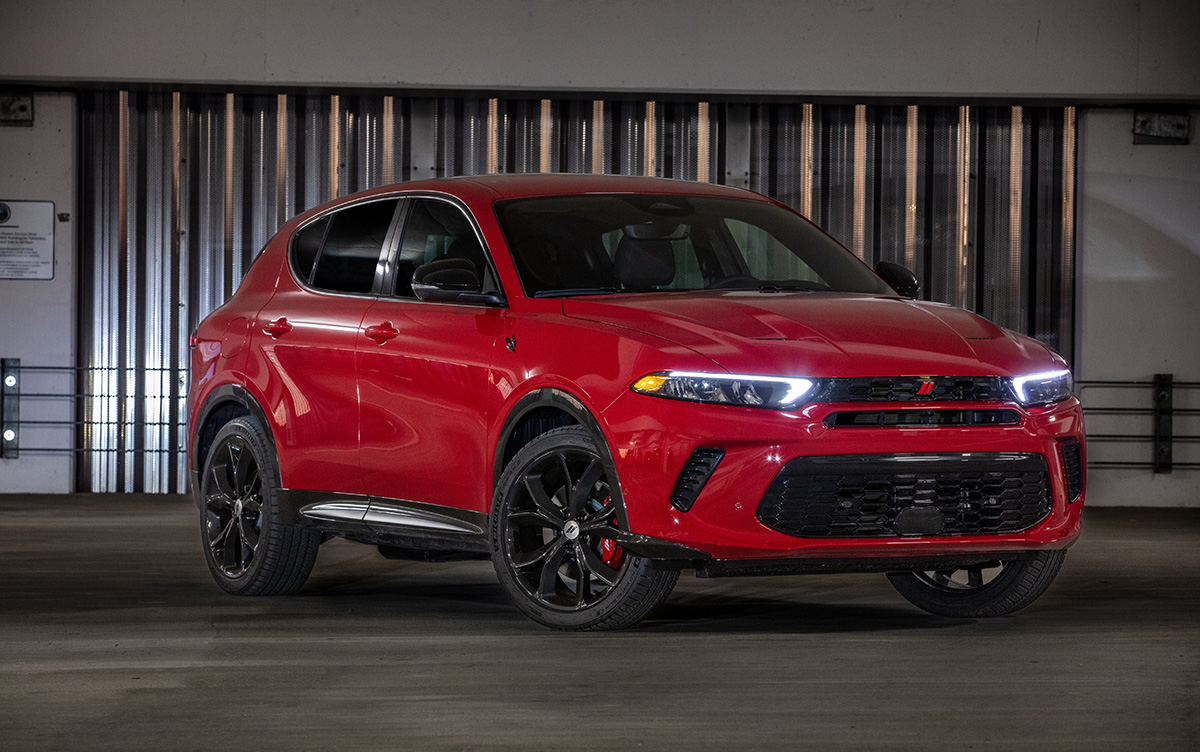
A new year means new vehicles sashaying into dealer showrooms. But for 2024, retro is in, with nostalgic nameplates like the Dodge Hornet and VW Bus proving everything old is new again. Between you and me, though, let’s leave the Cadillac Cimarron, Ford Edsel and anything remotely resembling a Yugo as footnotes to history.
DODGE HORNET PHEV
$41,000
Electric-only range: 33 miles
MPG: 74 MPGe (electric/gas), 29 MPG (gas only)
0 to 60 mph: 5.6 seconds
Cargo room: 54.7 cu. ft. with rear seats down
PROS: Stylish, comfy, peppy
CONS: Snug, bit bouncy, pricey
IN A NUTSHELL: According to automotive lore, the first Hornet (1905-1906) was a short-lived, two-seat runabout from Horner & Sons. Then came the British-built Wolseley Hornet (1930-1936, and again 1960-1961). Next up, the Hudson Hornet (1951-1957), available as family sedan, coupe or convertible. The performance-oriented coupe—nicknamed “Fabulous Hudson Hornet”—would rule the world of stock-car racing and establish the Hornet’s daredevil image. AMC created its own Hornet (1970-1977), but this time for a blah compact car—a sibling to the butt-ugly Gremlin. To be fair, one of the best movie stunts ever is James Bond performing a corkscrew car jump over a Bangkok river while driving an AMC Hornet.
Now, after a decades-long hiatus, Dodge has resurrected the Hornet name for its all-new subcompact SUV. While this latest Hornet debuted as a 2023 model with a gas engine, the buzz this year is the addition of a plug-in hybrid electric vehicle (PHEV)—the first ever from Dodge.
The Hornet PHEV comes in two versions: R/T and R/T Plus. Both pack plenty of punch, with twice the horsepower of many competitors. Use the paddle shifters to activate the PowerShot system, which adds an extra 30 horses for even more oomph. Alas, this feature—which allows the Hornet to boast muscle-car acceleration—lasts only about 15 seconds before the system needs to cool down for another 15 seconds.
But no matter the speed, the standard all-wheel drive and premium Brembo brakes keep everything under control. One handling complaint: Because of the short wheelbase, there is some annoying bobbing up and down over large potholes.
Built on the same platform as a tony Alfa Romeo Tonale, the Hornet shares similar design cues, including chiseled side panels, narrow LED headlights and high roofline. But only the Hornet has two sleek, functional hood scoops.
Inside, the Alfa ambience continues with a nicely sculpted dash, flat-bottom steering wheel and scooped-out center console. Even the door handles and infotainment system look the same in both vehicles.
As with all hornets, beware the sting. In this case, it’s pricing: A fully loaded Hornet R/T Plus can easily approach $55,000.
VOLKSWAGEN ID.BUZZ MICROBUS
$55,000 (est.)
Range: 260 miles
Fast-charge time: Up to 80% in 30 minutes
0 to 60 mph: 7.5 seconds
Cargo room: 138 cu. ft.
PROS: Fun colors, fun styling, fun ride
CONS: Limited appeal, limited production, limited trim level
IN A NUTSHELL: Legend has it that a Dutch businessman sketched the VW van after visiting a Volkswagen plant in 1947. Two years later a prototype was built, and the first Microbus rolled off the production line in 1950.
Production ceased in 2014, but only after countless variations were built—many with beds, sinks, tents, picnic furniture, surfboard racks and the like. This proud symbol of the counterculture hippie movement of the 1960s likely has been in more movies, TV shows, and magazine ads than there have been Grateful Dead concerts (2,300-plus so far, for all you Jerry Garcia fans).
While technically a 2025 model, the all-electric VW ID.Buzz arrives later this year. The chassis is from the ID.4 electric crossover, but everything else is new. Groovy colors include Cabana Blue, Mahi Green, Pomelo Yellow, Energetic Orange and more.
The space-age cabin has an “Orville” vibe, with a large 12.9-inch touchscreen hovering over the dash, 30-color ambient lighting and an expansive windshield. The accelerator even has an audio/video “Play” symbol engraved on the pedal, while the brake pedal is engraved with the “Pause” symbol. Too cute? Well, maybe…
Two trim levels, but only the long-wheelbase model will be sold in the U.S. That means three rows of seats, with optional captain’s chairs in the second row. The front seats even come with a massage function. Oh, and the optional panoramic sunroof with electrochromic tint can change from opaque to clear with the swipe of your finger. Shagadelic, baby!
While the Dodge Hornet R/T can trace its lineage to at least one fast and fabulous forebear, fans of this new VW can thank generations of Deadheads for spreading the love about the original bus. But crank up the sublime 14-speaker Harman Kardon stereo, and this new VW suddenly channels another far-out ride: “Priscilla, Queen of the Desert.”
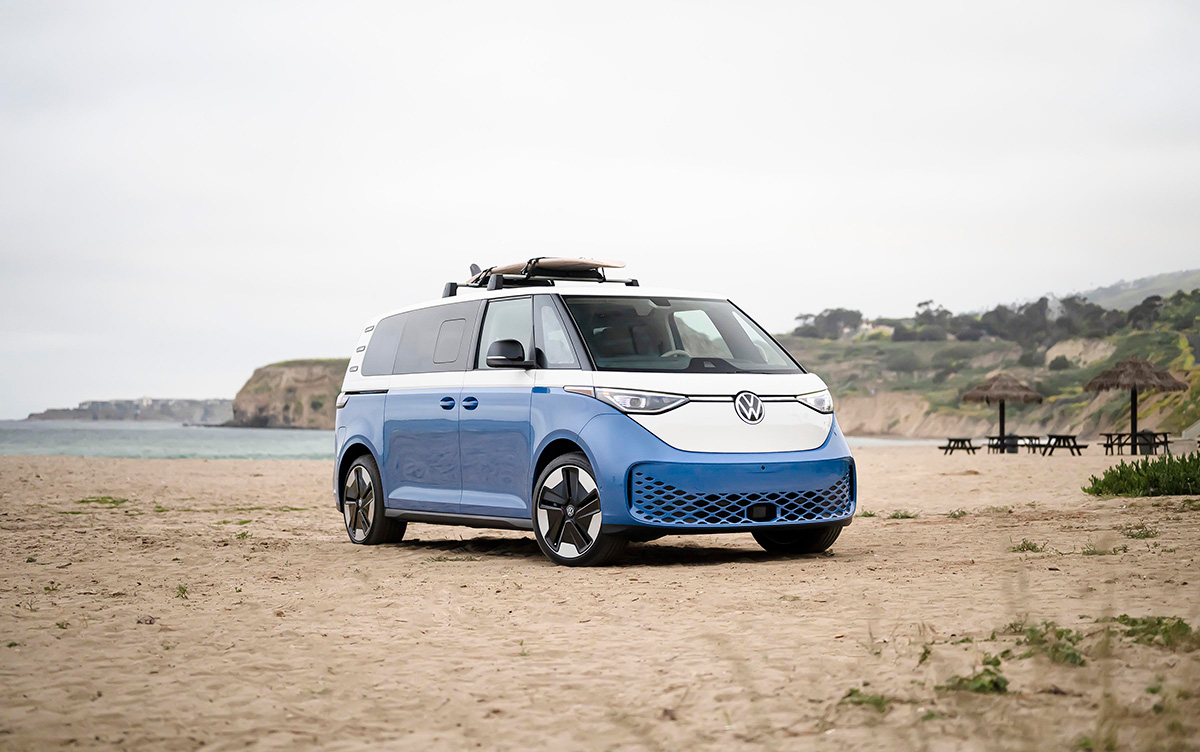
-

 a&e features4 days ago
a&e features4 days agoMusical Mondays, a mainstay in WeHo nightlife, celebrates 16 years
-

 National2 days ago
National2 days agoDiscredited former cop played ‘key role’ in deportation of gay make-up artist
-

 Arts & Entertainment3 days ago
Arts & Entertainment3 days ago‘Bring it to Brunch’ returns to West Hollywood
-

 Arts & Entertainment1 day ago
Arts & Entertainment1 day agoA Night of legacy, love, and liberation: Inside the 2025 April Fool’s Ball
-

 Myanmar3 days ago
Myanmar3 days agoLGBTQ+ advocacy group joins Myanmar earthquake relief effort
-

 California2 days ago
California2 days agoSouth Park provides green space to a predominantly Latino community
-

 a&e features3 days ago
a&e features3 days agoPeppermint thrives in the spotlight
-

 Arts & Entertainment1 day ago
Arts & Entertainment1 day agoSouth Coast Repertory Theatre hosting world premiere production
-

 Movies17 hours ago
Movies17 hours agoHeartfelt ‘Wedding Banquet’ remake a romcom worth seeing
-

 Brazil11 hours ago
Brazil11 hours agoUS lists transgender Brazilian congresswoman’s gender as ‘male’ on visa

